Action for Primates
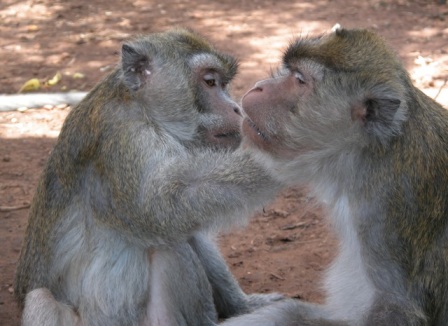
|
Action for Primates |

|
|
The following are take action items we have posted in 2023. See elsewhere for take action alerts from other years. In addition to the Take Action entries below, you can click here for petitions you can sign and share to help non-human primates around the world.
Index of action alerts; select date & title to access:
18 December 2023: Monkeys suffer in research to meet US regulatory requirements despite extensive human studies
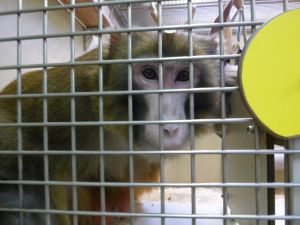
Two adult male rhesus macaques were subjected to major, invasive brain surgery and repeated episodes of anaesthesia at the Massachusetts Institute of Technology in the USA. The work was carried out in order to create an animal model
– for a method of delivering anaesthesia in human beings – to meet regulatory requirements by the US Food and Drug Administration (FDA) (Chakravarty et al 2023), despite extensive testing on human volunteers having already been carried out in several countries. The experiment was purported to have followed the guidelines of the MIT Animal Care and Use Committee and the US National Institutes of Health
, and was funded, in part, by public funds through NIH grants GM118269, MH115592 and NS123120.
An objective of this experiment was to see if applying a closed-loop anaesthesia delivery system to rhesus macaques could maintain a precisely specified level of unconsciousness as monitored by brain activity. Contrary to accepted practice and recommended guidelines (ARRIVE; Pomerantz et al 2022), the authors provided no information on the source of the macaques, how these individuals were housed, whether any environmental or social enrichment was provided, how any of the surgery was done nor the ultimate fate of the macaques. It was clear that major head and brain surgery was done in order to implant head posts onto the skulls and electrodes into the brains. The latter would have required craniotomies.
After being subjected to the head surgery, the macaques were forced into a sitting position and their heads severely restrained by use of the implanted head posts. Although not specifically mentioned, it is certain that the sitting position was maintained through the use of a so-called primate chair. The macaques were then given an intravenous anaesthetic repeatedly to see the effects on brain function related to consciousness. One individual was subjected to six such sessions, the other to three.
The authors stated they did this experiment because the FDA, although acknowledging the substantial benefits of this method of anaesthesia in human beings, has not approved such a system for human testing in the USA. These anaesthetic systems, however, have been studied and tested extensively in human volunteers in several countries including Belgium, Canada, France, Germany, India and the UK. The authors acknowledged this and provided many references to the research that has already been done. Why this information was not acceptable to the FDA is unclear and goes against all the principles of avoiding non-human animal use when there are credible – and more reliable – human-based safety data. The public are repeatedly told that non-human primates are used in research only when absolutely necessary and only when there are no other alternatives available. Once again, it is clear that such pronouncements are meaningless and that there appears to continue to be a lack of commitment to stop using non-human primates. The non-human primates in this study had to endure the stress of captivity, major survival surgery and severe restraint, to derive information already available, contrary to the Replacement criterion for the 3Rs.
The authors did not know if their current experiment will meet the requirements of the FDA, but plan on extending their research to involve other aspects of this anaesthetic protocol in non-human primates in order to simulate what already is being done in human patients. They want to be able to identify electroencephalographic markers of unconsciousness
so that they can seek FDA approval to eventually transition to experiments in humans.
Voice your objection to this inhumane use of non-human primates:
Cited information:
Craniotomy:
This is a surgical procedure to access the brain. Typically, an area on the head is shaved. An incision is made through the skin and tissues underlying it, down to the surface of the skull, in such a way as to create a flap that can be pulled away to expose the skull. Depending on what type of access to the brain is required, holes may be drilled through the skull into the brain cavity, for example for injections, or a portion of the bone may be cut out in order to implant a bank of electrodes. When done, bone cement may be used to fill in the hole in the skull and the overlying tissues sutured.
Primate chairs:

Head posts:
As the name implies, these are posts that are attached to the skull. Surgery is done on the head to dissect through skin and other tissues down to the surface of the skull. The post is cemented or screwed in place. Once healing has occurred, the post is used to restrain the head while recordings or other experimentation is done. It is almost always combined with a neck plate so that the non-human primate cannot move their heads.
28 November 2023: New investigation puts Mauritius monkey trade under the spotlight
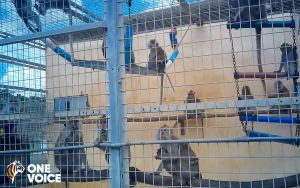
Mauritius promotes itself as a 'paradise island' and is popular as a holiday destination with its tropical climate and sandy beaches. Many people, however, are unaware of the hidden suffering behind the glossy holiday brochures – the country's cruel persecution of the long-tailed macaque population – for the global research and toxicity (poisoning) testing industry.
An investigation by our partner in France, One Voice, has shone a light on the expanding trade in long-tailed macaques in Mauritius. Action for Primates supported One Voice by providing intelligence and information to help with the planning of its investigation.
Click here to view the One Voice video on the investigation: Mauritus - English version
For further information: https://www.singes-de-labo.fr/en/
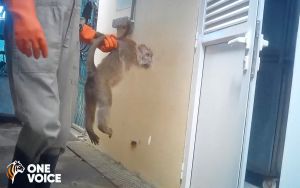
On Mauritius, long-tailed macaques are held captive at seven breeding and export companies – Noveprim, Bioculture, Cynologics, Biosphere, Les Campeches Ltd, Le Tamarinier and Biodia – their offspring taken away to be sold to laboratories in the USA and Europe. Disturbingly, Mauritius is also the world's greatest exporter of wild-caught primates, with the commercial trade in capturing wild long-tailed macaques for breeding and export having resumed in recent years.
Investigators for One Voice visited industrial scale facilities, housing thousands of monkeys imprisoned in unnatural conditions – their rightful home, the lush forests that surround the concrete pens, just out of reach. The monkeys were not provided natural foliage or earth so important for their health and well-being. At one facility – Noveprim – highly stressed monkeys, including those captured from the wild, were filmed being roughly handled by indifferent staff, grabbed by the tail and neck, with their arms pinned behind their backs. Others were carried and swung by their tails. Because long-tailed macaques do not have prehensile tails, this kind of handling can lead to spinal injuries.
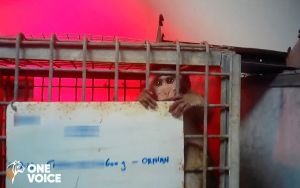
The macaque trade on Mauritius has escalated in recent years, from the export of 7,691 individuals in 2019, to 11,659 in 2020, 14,640 in 2021 and 11,897 in 2022. Most recently, between January and September this year, 11,768 macaques were exported, almost as many during the whole of 2022. This year, the monkeys have been sent to supply companies and laboratories in the USA, Spain, the UK and France, with 1,883 individuals exported to the USA in just one month – September.
Spain and France are at the heart of this cruel trade in Europe; with suppliers importing macaques from Mauritius and then selling them on to laboratories across Europe, including in the UK. In France, there is Silabe (Simian Laboratory Europe). Charles River Laboratories, the USA-based global contract testing corporation, is a major shareholder of Mauritius macaque supplier Noveprim which, in turn, is the owner of Camarney SL, a large holding facility in Tarrgona, Spain.
Information obtained by Action for Primates has revealed that in 2022, Mauritius exported 4,387 wild-caught macaques, all imported by the USA for the research and toxicity testing industry, and all supplied by just one Mauritius macaque supply company – Bioculture.
A spokesperson for Bioculture told Week-End, a Mauritius newspaper, that the company holds a permit issued by the Ministry of Agro-Industry and that monkeys are captured almost everywhere across the island in areas where there is a threat to biodiversity and agriculture
and there is no limit on the number captured.
Airlines transporting the macaques from Mauritius to the USA and Europe include Bluebird Nordic and Egyptair. On 7th November 2023, transit crates containing hundreds of long-tailed macaques from Mauritius were filmed at Barcelona airport in Spain. Transported as cargo by Bluebird Nordic, it is likely that these monkeys were destined for Camarney S.L.
Long-tailed macaques are the primary non-human primate species used in regulatory toxicity tests, which is the area in which most non-human primates are used. Toxicity (or poisoning) testing is carried out to assess adverse reactions to drugs (or chemicals), and often involves substantial suffering and always ends in death for the monkeys.
Despite widespread global concerns about the cruelty and inhumanity of capturing monkeys from the wild, breeding them in captivity and exporting them around the world in the cargo holds of aeroplanes, this brutal and shameful trade in Mauritius not only continues, but is increasing.
You can help the monkeys in Mauritius by voicing your concerns to the following:
17 November 2023: Dozens of monkey torture groups removed from Facebook following report
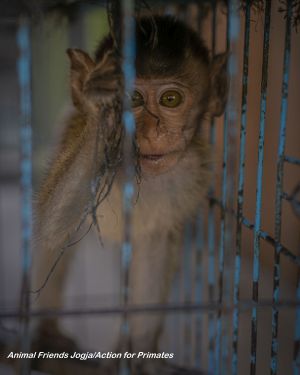
Action for Primates and Lady Freethinker have welcomed the removal of over 30 groups/profiles on Facebook that were responsible for continually posting sadistic and graphic content depicting the torture and killing of baby monkeys. The removal follows the sending of a new report by the groups – Monkey Abuse on Social Media – to Meta, along with a dossier of information about the groups/profiles that were regularly in violation of Meta's policy by posting content depicting deliberate and obvious physical torture of monkeys. An appeal was made to Meta to take immediate action to stop enabling these monkey torture groups to operate on its platform, by removing and banning these accounts, and by introducing stronger measures to identify such content and to stop it from being posted in the first place.
The report published by Lady Freethinker and Action for Primates, reveals that monkey abuse content is increasing in prevalence across the world's top social media platforms – Facebook, YouTube, TikTok, and X (formerly known as Twitter). Between May-October 2023, we logged 857 videos and images overall; with the majority of videos, and those showing some of the worst cruelty, being posted on Facebook. Examples included infant monkeys having their eyes drilled out; parts of their body cut or ripped off; their bones broken; set alight – the pain, suffering and distress these vulnerable infant monkeys are subjected to for 'entertainment' on social media platforms, is harrowing and heartbreaking.
Although we are grateful for the action taken by Meta in response to our appeal, Lady Freethinker and Action for Primates remain disappointed that these groups/profiles were active on Facebook, and had not already been taken down by Meta because of the sadistic and graphic nature of the content posted. We urge Meta to police its own guidelines rigorously and proactively, as well as to respond promptly and effectively to complaints, to help remove the incentive for people to commit and film these despicable acts of cruelty. We also anticipate that the recent passing of the Online Safety Act in the UK will make social media platforms legally obliged to implement and enforce strict guidelines prohibiting animal cruelty content.
Please sign the petition to Facebook: Remove Animal Cruelty From Facebook
asking them to:
We urge everyone to not watch, comment, share, or otherwise interact with monkey torture videos, as doing so helps boost the posts' visibility and views for these despicable groups. Instead, always report videos depicting animal cruelty to platforms' reporting systems.
Action for Primates and Lady Freethinker are members of the Social Media Animal Cruelty Coalition (SMACC); an initiative from the Asia for Animals coalition dedicated to stamping out animal abuse on social platforms worldwide. Visit the link to find out more, and to learn how to report animal cruelty content on social media platforms.
14 November 2023: Rhesus macaques used in UK experiment despite humane alternatives
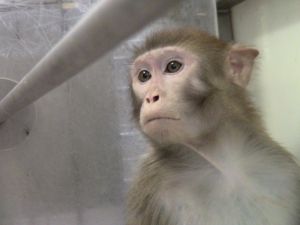
Two adult male rhesus macaques (referred to as Monkey U and Monkey W) were used to study how they 'made decisions' at the University of Cambridge in the UK (Burrell et al 2023). The macaques were trained
over the course of >5,000 trials to work for liquid rewards while, according to the authors of the published research, being mildly fluid deprived
for six days a week. They could not satisfy their thirst until they 'performed' in the experiment, which involved choosing between two options presented on a computer screen. At the end of each day, they were finally allowed free access to fluids to ensure the minimum daily fluid requirements were met
.
Each day, the monkeys were restrained in what was euphemistically called a primate chair, in a darkened room, with a computer monitor placed 50 cm in front of them. A joystick was accessible through an opening in the front panel of the 'chair', which they had to manipulate in order to receive juice rewards. No information was provided regarding how many hours a day the monkeys were forced to carry out these behavioural tasks, nor for how many days, weeks, or months the experiment took place. The macaques were ostensibly obese judging by their reported weights: 14.5 and 11.5 kg. The average for adult male rhesus macaques is less than 8 kg This condition of being overweight is not unexpected in individuals who are imprisoned in laboratory cages, with little or no opportunities or incentive for meaningful exercise. Contrary to accepted practice (ARRIVE; Pomerantz et al 2022), important for scientific reliability, the researchers did not provide information about the housing of the macaques or whether there was any social or environmental enrichment.
The ages of the monkeys were not provided, nor their history, how long they had been kept at the University, and whether they had been subjected to previous experimentation. Further, the authors did not state what happened to the monkeys at the end of the experiment. For a university that prides itself on its animal welfare policy, it is reprehensible that so little in the way of detail was provided about these individual animals. It seems clear that the authors had no interest in the macaques for the sentient and sensitive individuals they were – subjects of a life that was important to each macaque – nor for suffering they forced the macaques to endure. Instead, the authors appeared to view the macaques as little more than tools. Action for Primates finds this highly disturbing.
The authors stated that this project was ethically reviewed, approved, regulated and supervised
by the University of Cambridge animal use committee and many other entities including the UK National Center for Replacement, Refinement and Reduction of Animal Experiments. The work was supported by Wellcome Trust grants WT 095495, WT 204811, and WT 206207; the European Research Council grant 293549; and the National Institute of Mental Health grant P50MH094258.
Read more...
What you can do to help:
Additional information:
Given that there is no way to know what the macaques were thinking, especially because they were responding to fluid deprivation, their responses had no implications for humans. Further, this kind of research has been and can continue to be done easily in humans. The authors acknowledged that what they 'learned' from this experiment was in line with numerous studies in humans
. The macaques had to endure laboratory conditions, their lives controlled and manipulated – coerced into performing unnatural and repetitive tasks through fluid deprivation and restraint. All this for information we already knew from studying humans.
The University of Cambridge make several broad claims with respect to using non-human animals in research:
We place good welfare at the centre of all our animal research and aim to meet the highest standards
We only use animals in research where there are no alternatives...Our researchers are actively researching alternatives that can be used in place of animals.
scrutinises research projects and procedures involving the use of live animals to ensure that the 3Rs – reduction, refinement and replacement – have been adequately applied and retrospectively review research projects with this in mind. This committee is proactive in the promotion of a culture of 3Rs within the University community, ensuring effective experimental design, and promotes awareness of alternatives where available.
The University cannot logically or reasonably argue that there were no alternatives to using non-human primates. This experiment is unquestionably and appropriately suited to doing in human volunteers. Action for Primates believes that this macaque research is another glaring example that any claims about only using non-human animals where there are no alternatives
or that there is scrutiny to ensure that the 3Rs
have been followed are not only disingenuous, but also misleading.
The information in non-human primates is irrelevant to people given the fundamental differences between the two species. We are not the only ones who know this to be the case. Other researchers have been critical of the use of non-human primates to 'model' the human (Lahvis 2023; Magliaro & Ahluwalia 2022; McManus 2013; Petticrew & Smith 2012; Sapolsky 1993).
Cited information:
We need healthy controls, not psychologically broken ones, to benchmark our disease models. And we need the animals used as disease models to be otherwise healthy because we lack the scientific capacity to separate the biology of a nuanced disorder, like autism or ADHD, from confounding factors like the mental damage caused by incarceration...researchers lured us into believing the ridiculous — that brain development behind steel bars is not only normal but natural enough to be relevant to evolutionary changes occurring outside the lab. Yet their monkeys experienced no full spectrum of color, no natural movement like the rustling of leaves, and no passing landscape...[normalizing] the idea that monkeys naturally live inside telephone booths, not in the vast, dynamic, and aesthetically complex expanses of nature. What bothers me most is that the scientific community expresses so little concern about whether we're chasing artifacts of confinement.
...the impact of social, psychological and economic factors that determine the onset and persistence of addiction (and recovery from it) in humans. Indeed, the predictive validity of animal models of addiction is poor, with few effective treatments deriving from animal studies. ...the principal argument against animal experiments in the field of substances of abuse is that addiction in humans is a complex disorder which encompasses psychological, social and emotional variables that are impossible to model in animals.
[Elias A. Zerhouni, M.D., NIH Director 2002-2008]: "We have moved away from studying human disease in humans," he lamented. "We all drank the Kool-Aid on that one, me included." With the ability to knock in or knock out any gene in a mouse—which "can't sue us," Zerhouni quipped—researchers have over-relied on animal data. "The problem is that it hasn't worked, and it's time we stopped dancing around the problem...We need to refocus and adapt new methodologies for use in humans to understand disease biology in humans."
Primatologists themselves have warned repeatedly about over-generalising from primate data to human societies...the data may not even be generalisable between similar species of monkey, as comparative research and field studies suggest that there are striking differences in group composition, social spacing, dominance and aggression between species...The social and hierarchical behaviour of Macaca fascicularis, the species used in many of these studies, may not therefore even be representative of all of its own genus, which raises doubt about extrapolation to higher primates.
Please refer to the original paper for full quotes and context of this paraphrasing:it may be questioned whether animal models can ever truly mimic human psychiatric disorders...primates, with their complex social lives, cognitive skills, and emotional nuances, have been particularly attractive objects of psychiatric research interest...The problem arises from the circuitous and often tragic routes by which primates come to find themselves in laboratories...This necessitates a lengthy and traumatic transport of primates...[deaths or illness during transport] at least partially reflect the immunosuppressive effects of the stressfulness of capture and transport...survivors (and their descendents) may be the most physically and psychiatrically robust of individuals, or may, alternatively, remain permanently weakened or damaged by these vicissitudes.
Primate chairs:

9 November 2023: New report reveals shocking prevalence of baby monkey torture across social media
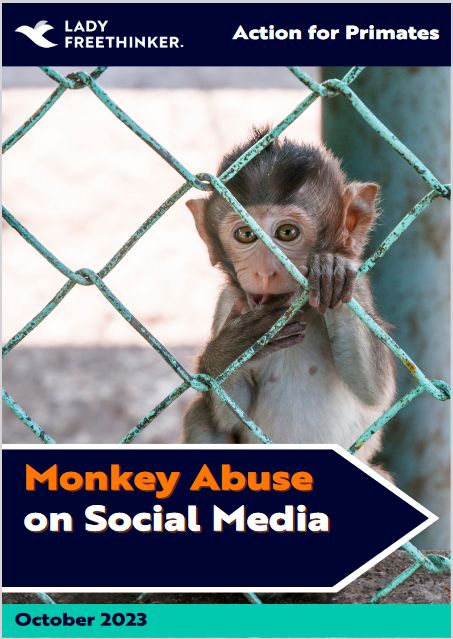
A new report from Action for Primates and Lady Freethinker reveals that the world's top social media platforms are allowing content showing infant macaques being brutally tortured and killed to be posted and shared at an alarming rate.
The report, Monkey Abuse on Social Media, reveals that online platforms Facebook, YouTube, TikTok, and X (formerly known as Twitter) have hosted videos of infant macaques being set on fire, strangled, drowned, killed, and having parts of their bodies cut off – including limbs, genitals, fingers and toes.
The groups logged 857 videos and images on social media depicting monkey torture and abuse between May 2023 and October 2023, with the majority of the content found on Facebook. Facebook is also where some of the worst cruelty was found, including videos showing monkeys being sealed inside glass jars, a monkey having their eyes drilled out with a power tool, another having their arm ripped off at the shoulder, and another who was hacked to pieces with a box cutter.
Dr Nedim Buyukmihci, veterinarian and co-founder of Action for Primates, stated: As a veterinarian with many decades of experience, I have never witnessed the degree of sadism I have seen in these videos. What the people are doing to these infant monkeys is particularly grotesque and disturbing. It is untenable that any social media company would tolerate the existence of such individuals and groups on their platforms, not only because of the appalling nature of the atrocities being inflicted upon non-human primates, but also because of the harmful and damaging impact the viewing of such content will have on people, especially children.
Nina Jackel, founder and president of Lady Freethinker, stated: Violent, sadistic content has no place on social media, where users of all ages may be exposed to horrific animal cruelty. We're calling on Facebook, YouTube, TikTok, and X to put systems in place to swiftly remove posts promoting animal cruelty and take strong measures to stop it from being posted in the first place.
Lady Freethinker and Action for Primates are urging everyone to never watch, comment, share, or otherwise interact with monkey torture videos, as doing so helps boost the posts' visibility and views. Please, instead, always report videos depicting animal cruelty to platforms' reporting systems.
What you can do: If you have not already, please sign the petition urging Facebook to do more to prevent animal torture content from appearing on their platform: https://ladyfreethinker.org/sign-remove-animal-cruelty-from-facebook/
Action for Primates and Lady Freethinker are members of the Social Media Animal Cruelty Coalition (SMACC); an initiative from the Asia for Animals coalition dedicated to stamping out animal abuse on social platforms worldwide. To find out more, and to learn how to report animal cruelty content on social media platforms: https://www.smaccoalition.com/
1 November 2023: Rhesus monkeys subjected to deprivation, physical coercion and death to study brain function in USA
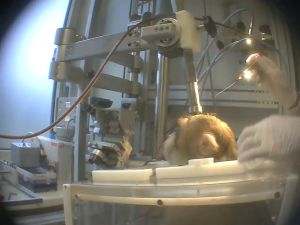
Rhesus macaques were subjected to multiple survival surgeries to have devices implanted in their skulls and brains, water deprivation, physical coercion and death at the National Eye Institute (NEI; a branch of the National Institutes of Health) in the USA (Maeda et al 2023). The research project involved collaboration with researchers from two institutions in Japan – the National Center of Neurology and Psychiatry and Kyoto University. It was supported by the USA tax payer through NEI grant EY000415, which apparently is in its 20th year of funding, involving tens of millions of $US.
Read more...
What you can do to help (for more information on the issue, see below):
Additional information:
Two adult male rhesus macaques trained
to respond to certain stimuli using what the authors referred to as water control
. The latter is a euphemism for water deprivation. NIH guidelines allow water to be withheld for as long as 24 hours. The authors stated that they reduced the total amount of water daily until the macaques would perform experimental tasks appropriately
. There was no mention of how the individuals were housed, whether they were allowed the critical direct social contact with other macaques necessary for nominal well-being, particularly under laboratory conditions.
The macaques were subjected to at least two invasive surgical procedures on their heads. One was to dissect down to the skull and implant a head holder [head post] and a recording chamber
. After at least two months, they were subjected to brain surgery involving a craniotomy in order to implant electrodes deep into the brain. They were then forced to sit in what was euphemistically referred to as primate chairs
, facing a screen in a sound-attenuated room. They were immobilised with their heads severely restrained through clamping the head post that had been implanted onto their skulls. Recordings were made from the brain as the macaques responded repeatedly to stimuli in order to receive a water reward
delivered through a sipper tube positioned in front of the monkey's mouth
. When that phase of the experiment was concluded, the macaques were killed and their brain removed for further examination.
The authors claimed that they were learning about how the amygdala, important in emotions, functioned, using the macaques as 'models' of humans. The information derived, however, had nothing to do with human brain function. The only way to study human brain function is to use human volunteers. When a macaque responds to stimuli, this provides no clues with respect to what they are experiencing and is further complicated by being dictated by thirst. Certainly, there is no way to know what emotions are involved. On the other hand, there can be direct communication with the human subject so that important, and sometimes nuanced but vital, information can be obtained. The world scientific literature contains the results of hundreds of such studies, many of them involving the amygdala. Many are elegant and demonstrate the ingenuity of the researchers in getting humane and human-relevant data. We need to discontinue funding or otherwise supporting research involving unwilling and non-consenting individuals – non-human primates in this case. Instead, the resources – financial and intellectual – should be concentrated on human studies. The human being is an incredibly intelligent and resourceful species. There is no need to subjugate and kill others in the name of science. To continue to do so only diminishes us morally.
The public are repeatedly told that non-human primates are used in research only when absolutely necessary and only when there are no other alternatives available. This shameful experiment, which resulted in substantial suffering and loss of life for the macaques, demonstrates the meaningless nature of such assurances and a lack of commitment to stop using non-human primates. The non-human primates in these studies have to endure the stress of captivity, virtual social isolation, major survival surgery, severe restraint and, in some cases, death, for what can only be considered frivolous reasons and clearly contrary to the Replacement criterion for the 3Rs.
The information in non-human primates is irrelevant to people given the fundamental differences between the two species. We are not the only ones who know this to be the case. Other researchers have been critical of the use of non-human primates to 'model' the human (Lahvis 2023; Magliaro & Ahluwalia 2022; McManus 2013; Petticrew & Smith 2012; Sapolsky 1993).
Cited information:
We need healthy controls, not psychologically broken ones, to benchmark our disease models. And we need the animals used as disease models to be otherwise healthy because we lack the scientific capacity to separate the biology of a nuanced disorder, like autism or ADHD, from confounding factors like the mental damage caused by incarceration...researchers lured us into believing the ridiculous — that brain development behind steel bars is not only normal but natural enough to be relevant to evolutionary changes occurring outside the lab. Yet their monkeys experienced no full spectrum of color, no natural movement like the rustling of leaves, and no passing landscape...[normalizing] the idea that monkeys naturally live inside telephone booths, not in the vast, dynamic, and aesthetically complex expanses of nature. What bothers me most is that the scientific community expresses so little concern about whether we're chasing artifacts of confinement.
...the impact of social, psychological and economic factors that determine the onset and persistence of addiction (and recovery from it) in humans. Indeed, the predictive validity of animal models of addiction is poor, with few effective treatments deriving from animal studies. ...the principal argument against animal experiments in the field of substances of abuse is that addiction in humans is a complex disorder which encompasses psychological, social and emotional variables that are impossible to model in animals.
[Elias A. Zerhouni, M.D., NIH Director 2002-2008]: "We have moved away from studying human disease in humans," he lamented. "We all drank the Kool-Aid on that one, me included." With the ability to knock in or knock out any gene in a mouse—which "can't sue us," Zerhouni quipped—researchers have over-relied on animal data. "The problem is that it hasn't worked, and it's time we stopped dancing around the problem...We need to refocus and adapt new methodologies for use in humans to understand disease biology in humans."
Primatologists themselves have warned repeatedly about over-generalising from primate data to human societies...the data may not even be generalisable between similar species of monkey, as comparative research and field studies suggest that there are striking differences in group composition, social spacing, dominance and aggression between species...The social and hierarchical behaviour of Macaca fascicularis, the species used in many of these studies, may not therefore even be representative of all of its own genus, which raises doubt about extrapolation to higher primates.
Please refer to the original paper for full quotes and context of this paraphrasing:it may be questioned whether animal models can ever truly mimic human psychiatric disorders...primates, with their complex social lives, cognitive skills, and emotional nuances, have been particularly attractive objects of psychiatric research interest...The problem arises from the circuitous and often tragic routes by which primates come to find themselves in laboratories...This necessitates a lengthy and traumatic transport of primates...[deaths or illness during transport] at least partially reflect the immunosuppressive effects of the stressfulness of capture and transport...survivors (and their descendents) may be the most physically and psychiatrically robust of individuals, or may, alternatively, remain permanently weakened or damaged by these vicissitudes.
Craniotomy:
This is a surgical procedure to access the brain. Typically, an area on the head is shaved. An incision is made through the skin and tissues underlying it, down to the surface of the skull, in such a way as to create a flap that can be pulled away to expose the skull. Depending on what type of access to the brain is required, holes may be drilled through the skull into the brain cavity, for example for injections, or a portion of the bone may be cut out in order to implant a bank of electrodes. When done, bone cement may be used to fill in the hole in the skull and the overlying tissues sutured.
Primate chairs:
So-called 'primate chairs' are restraint devices which secure the individual in an unnatural sitting position. Further restraint is often used through a neck plate which goes around the neck to prevent side-to-side or front to back movements of the head. The head may be severely restrained through the use of a post surgically implanted into the skull and held by part of the chair. Depending on the procedures being done, the arms and legs may be secured further by taping them to the chair supports.
Head posts:
As the name implies, these are posts that are attached to the skull. Surgery is done on the head to dissect through skin and other tissues down to the surface of the skull. The post is cemented or screwed in place. Once healing has occurred, the post is used to restrain the head while recordings or other experimentation is done. It is almost always combined with a neck plate so that the non-human primate cannot move their heads.
12 October 2023: Baboons killed in brain research in Spain
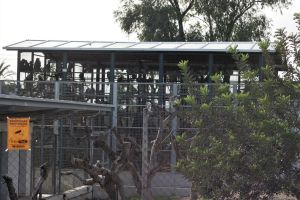
The work was done at University of Murcia (Universidad de Murcia) in Spain, and all the baboons used in this research were from the University's baboon colony. Four adult (three to 14 years old) male and female olive baboons were given injections into their brains using brain material from human patients who had Parkinson's disease. The intent of this pilot study
was to see if there would be alteration of the structure of the baboon brains as a result (Teil et al 2023). Four other adult olive baboons served as untreated control animals
. The authors stated that the Institutional Animal Care and Ethical Committee of Murcia University (Spain) approved non-human primate experiments under the license number REGA ES300305440012.
All eight baboons were killed after a year and their brains removed for examination.
Although the authors stated that all the baboons were monitored for survival and clinical observations, there appeared to be no mention of any information related to this. The injected baboons developed degenerative lesions and inflammation in their brains, but there was no information on what effect this damage had on the welfare or well-being of the individuals. Inflammation of the brain usually results in clinical signs or symptoms, including difficulty in moving or headaches.
It is clear from the authors' conclusions that they plan to do additional and more extensive studies using a greater numbers of baboons, presumably involving the killing of many more individuals from the University of Murcia.
Read more...
What you can do to help:
Action for Primates is supporting Abolición Vivisección in calling for the release of the baboons from the University of Murcia. Please join us by signing and sharing our petition linked below (Abolición Vivisección, One Voice and People for the Ethical Treatment of Animals) appealing to the Ethics Committee for Animal Experimentation of the University of Murcia (CEEA) and the competent administrations in Spain, to release the baboons to a sanctuary so they may live the remainder of their lives free from exploitation:
Additional information:
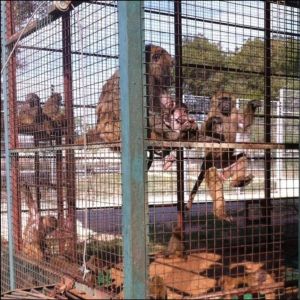
This experiment was a tragic waste of life. The same laboratory has been doing similar experiments, involving injections into the brains, and killing dozens of other baboons over the last several years (Arotcarena et al 2020; Bourdenx et al 2020; Teil et al 2022). All these projects have been under the same license number (REGA ES300305440012) and all approved by the University of Murcia institutional animal care committee. Not only are the findings of little value to people with brain disease, the kind of information being sought can easily – and ethically – be derived from tissue samples from human patients who have died from their disease. The authors cited several such studies. The eminent pathologist Dr Lorenz Zimmerman pointed out years ago that human autopsies can provide more information towards understanding human disease than so-called animal models of human disease (Zimmerman 1984). This sentiment of the importance of studying humans, not other animals, was echoed by Dr Elias Zerhouni, a recent director of the National Institutes of Health (McManus 2013).
According to reports, the baboon colony at the university was established many years ago, with baboons imported from Kenya and South Africa and used for xenotransplantation research – the transplantation of tissues or organs from one species to another. This research is some of the most gruesome and traumatic work carried out on non-human animals. In 2022, in response to a Freedom of Information request about the baboon colony, submitted by Abolición Vivisección, the Murcia Regional Authority stated that there was a total of 80 baboons present, of which 45 were under four years of age. It was also stated that the facility was considered to be a supply establishment, and that the baboons were available to any other facility interested in using the baboons.
Maintaining this colony of baboons encourages their use and goes against the Spanish and EU commitment to the 3Rs, in particular the Reduction in the number of animals used in laboratories. In their native habitat, a baboon troop will roam about 4 to 13 kilometres a day. At the University of Murcia, these imprisoned baboons are cruelly denied their freedom, and are destined to suffer and be killed in experiments.
References:
[Elias A. Zerhouni, M.D., NIH Director 2002-2008]: "We have moved away from studying human disease in humans," he lamented. "We all drank the Kool-Aid on that one, me included." With the ability to knock in or knock out any gene in a mouse—which "can't sue us," Zerhouni quipped—researchers have over-relied on animal data. "The problem is that it hasn't worked, and it's time we stopped dancing around the problem...We need to refocus and adapt new methodologies for use in humans to understand disease biology in humans."
...the autopsy continues to be as potentially useful as ever in monitoring the quality of patient care, providing physicians with one of the best methods of continuing their medical education, and furnishing scientific data for medical research that can never be matched by the most imaginative of investigative protocols for animal models of human disease.
Fourteen baboons were killed 24 months after injection.
Seventeen baboons were killed 24 months after injection.
Eight baboons were killed 24 months after injection.
Pilot studies:
As the name implies, these are exploratory studies to see if there are results of interest. If so, the researchers would seek financial support to conduct more experiments, using a greater number of animals and more manipulations. It is rare for researchers to end a line of inquiry with a pilot study. In almost all cases, they will state that more work is needed to answer other questions.
2 October 2023: Wake Forest University in USA continues forcing monkeys to become cocaine addicts
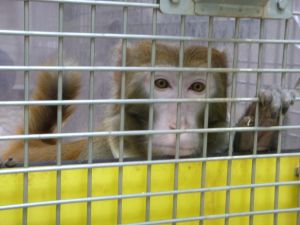
Eight rhesus macaques were used and killed at Wake Forest University in an attempt to find out what cocaine did to their brains long-term (Porrino et al 2023). This was another experiment in a long line of research on substance abuse carried out on monkeys at the university, funded through US tax payers, and approved by their animal use committee. In this case, the work was funded by National Institute on Drug Abuse, a branch of the National Institutes of Health, grants DA006634 and DA009085, involving many millions of US dollars.
There was no description of how the eight male rhesus macaques were housed, other than to say that each individual had a home cage
from which they were taken and placed in what the researchers euphemistically referred to as primate chairs
. There the macaques were forced to consume cocaine, eventually resulting in self-administration
. They were subjected to 300 sessions over 18 months during which cocaine was self-administered
, resulting in a total of 2.75 grams/kilogram of body weight of cocaine intake. Towards the end, they were subjected to surgery to insert a catheter into the main artery in the leg. At the end, they were injected with a radioactive tracer and blood was removed at intervals through this catheter until at about 45 minutes when they were killed (euphemistically referred to as euthanized
) and their brains removed.
The purpose of the research was to see if certain biochemical changes in brain increased with prolonged use of cocaine. Because this is what occurred, the researchers believed this might be a way to treat human users of cocaine. As is always the case, none of these kinds of projects ever has a finite end and this one was no exception. The researchers stated, Testing with longer durations of exposure may provide stronger translational evidence before undertaking expensive clinical trials in individuals with CUD [cocaine use disorder].
Cocaine is a highly addictive and dangerous and can seriously affect the health and well-being of human users. Despite this, there was no description of the effects of this drug on the macaques with respect to their behaviour, appearance, welfare and well-being.
Action for Primates has repeatedly maintained that imprisoning sentient, intelligent and highly social beings in cages and deliberately manipulating their psychological and physical health and well-being through forcing them to ingest highly addictive and dangerous drugs, might seem subjects for horror films. The reality, however, is that this appalling treatment is inflicted upon hundreds of non-human primates every year, imprisoned in government and academic facilities and universities across the US, and almost always funded publicly by the tax-payer.
This inhumane attempt at trying to find a 'silver bullet' treatment is morally unconscionable as well as ineffective. The complex combination of factors at play, such as genetics, emotional and personal experiences and socioeconomic aspects, can never be simulated or resolved through non-human primate research. Substance abuse is a purely human issue and cannot be addressed using non-human primates or any other non-human animal. As pointed out by other researchers in the field, addiction in humans is a complex disorder which encompasses psychological, social and emotional variables that are impossible to model in animals
. The millions of tax dollars spent every year on trying to turn monkeys into surrogates for human drug addicts could be better used to directly help the millions of people who suffer from substance abuse.
The public are repeatedly told that non-human primates are used in research only when absolutely necessary and only when there are no other alternatives available. This shameful experiment once again demonstrates the meaningless nature of such assurances and a lack of commitment to stop using non-human primates. Not only is the information in macaques irrelevant to people given the fundamental differences between the two species, humane and ethical clinical studies have been and can continue to be done on human patients and volunteers in order to get data that are directly applicable to people.
What you can do to help stop this continued abuse of non-human primates:
References:
...the impact of social, psychological and economic factors that determine the onset and persistence of addiction (and recovery from it) in humans. Indeed, the predictive validity of animal models of addiction is poor, with few effective treatments deriving from animal studies. ...the principal argument against animal experiments in the field of substances of abuse is that addiction in humans is a complex disorder which encompasses psychological, social and emotional variables that are impossible to model in animals.
Primate chairs:
So-called 'primate chairs' are restraint devices which secure the individual in an unnatural sitting position. Further restraint is often used through a neck plate which goes around the neck to prevent side-to-side or front to back movements of the head. The head may be severely restrained through the use of a post surgically implanted into the skull and held by part of the chair. Depending on the procedures being done, the arms and legs may be secured further by taping them to the chair supports.
25 September 2023: Over 4,000 wild-caught monkeys imported from Mauritius by USA for research and toxicity testing industry
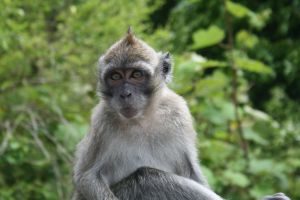
Information obtained by Action for Primates has revealed that thousands of long-tailed macaques captured from the wild in Mauritius have been imported by the USA for the research and toxicity (poisoning) testing industry. This information has come to light following a Freedom of Information request which revealed that, in 2022, the USA imported over 8,000 long-tailed macaques from Mauritius, including 4,387 who were wild-caught (1).
Mauritius is the world's largest exporter of wild-caught non-human primates. Despite widespread global concerns about the cruelty and inhumanity of capturing monkeys from the wild, this brutal and shameful trade in Mauritius has escalated in recent years. According to the records obtained by Action for Primates, all of the wild-caught monkeys were exported by one non-human primate supply company in Mauritius: Bioculture (Mauritius) Ltd. Bioculture also exported hundreds more macaques who were reported as either being born or bred in captivity. Other Mauritius companies that exported monkeys to the USA in 2022 were Noveprim, Le Tamarinier, Les Campeches LTEE and Cynologics.
What you can do to help (for more information on the issue, see below):
There are two companies in the USA responsible for importing most of these wild-caught monkeys: non-human primate dealers Worldwide Primates and BC US LLC (a Bioculture facility), both located in Florida. The other US importers of wild-caught macaques during 2022 were Alpha Genesis, LC Preclinical Research and PreLabs.
Other USA companies that imported long-tailed macaques (recorded as born or bred in captivity) from Mauritius during 2022 were global contract testing corporations Charles River Laboratories and Envigo Global Services, and the University of Louisiana (Iberia Primate Research Center). Charles River Laboratories is also a major shareholder of Mauritius macaque supplier Noveprim which, in turn, is the owner of the Spanish company Camarney SL in Camarles, the European importer and supplier of long-tailed macaques. The majority of long-tailed macaques used in laboratories in the EU and the UK originate in Mauritius and are exported directly or via Camarney SL (2).
The findings by Action for Primates were reported in Week-End, the popular independent French-language newspaper in Mauritius, as well as online in le Mauricien. A spokesperson for Bioculture told Week-End that the company holds a permit issued by the Ministry of Agro Industry and that monkeys are captured almost everywhere across the island in areas where there is a threat to biodiversity and agriculture
and that there is no limit on the number captured.
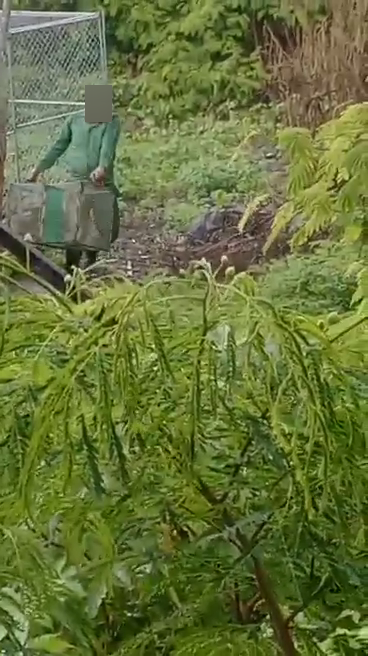
Sarah Kite, co-founder of Action for Primates told Week-End: Despite widespread global concerns by scientists and animal protection groups about the cruelty and inhumanity of capturing monkeys from the wild, this brutal trade in Mauritius has escalated in recent years. The 4,387 wild-caught individuals exported by Mauritius in 2022 represents an immense level of suffering and distress. Allowing our closest living relatives in the animal kingdom to be mistreated in this way is inhumane and shameful.
The substantial negative impact caused by trapping and removal of wild monkeys from their natural habitat and social groups is universally recognised by relevant organisations and official bodies, for example, the European Union (EU) (3) and the International Primatological Society (4). There is a ban in the EU on the import of wild-caught non-human primates for laboratories.
As the leading importer in long-tailed macaques, the USA is a major player in the global trade: importing long-tailed macaques from Vietnam, Indonesia, the Philippines, Mauritius and, until recently, Cambodia. It is a trade that is not only immoral and inhumane, but also one that is having a devastating impact on the species and its wild populations. The future of these highly evolved non-human primates, who play an important role in biodiversity and ecosystems, is under threat. The conservation status of the long-tailed macaque has been increased to Endangered with a decreasing population trend by the International Union for the Conservation of Nature (IUCN) Red List of Threatened Species (5).
Long-tailed macaques are the primary non-human primate species used in regulatory toxicity tests, which is the area in which most non-human primates are used. Toxicity (or poisoning) testing is carried out to assess adverse reactions to drugs (or chemicals), and often involves substantial suffering and always ends in death for the monkeys.
Action for Primates is calling upon the USA government to dissociate itself from this extreme cruelty by banning all imports of long-tailed macaques. We also appeal to the Mauritius government to stop exporting monkeys for use in laboratories. Rather than dismissing the long-tailed macaque as a 'pest', allowing trapping and killing or their capture for laboratories, the government should protect the species and develop a humane plan to manage any negative interactions, bearing in mind that these are almost entirely human-created.
References:
18 September 2023: New Report reveals abuse of 'pet' macaques for social media content
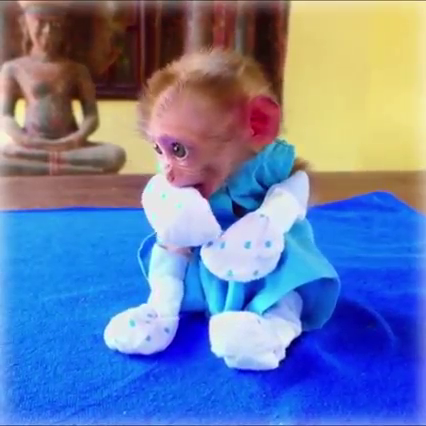
A new report reveals the extent to which macaques kept as 'pets' are being physically and psychologically abused for social media content. The report, The cruelty you don't see: The suffering of pet macaques for social media content, has been compiled by a coalition of 20 animal protection organisations, including Action for Primates. It documents disturbing evidence of monkeys – the majority of whom are long-tailed and pig-tailed macaques – being deliberately and blatantly abused on social media platforms such as Facebook and YouTube.
The research, undertaken by the Asia for Animals Social Media Animal Cruelty Coalition (SMACC), recorded 1226 content links from Facebook, Instagram, TikTok and YouTube, showing macaques kept as 'pets' between September 2021 and March 2023. The content ranged from seemingly 'harmless' treatment to the violent and graphic torture of macaques, and collectively had over 12 billion views.
The research found:
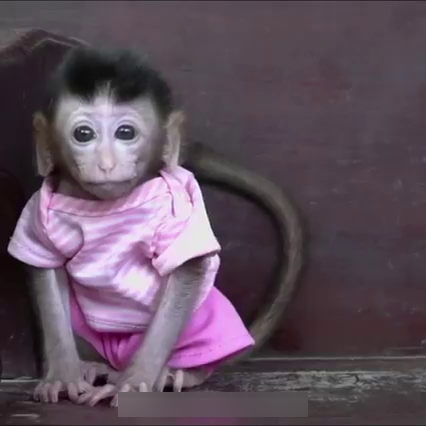
Videos showing monkeys kept in human households, dressed in clothing, and wearing diapers are popular on social media, with some videos reaching millions of views, and attracting comments on how "cute" and "entertaining" the content is. Behind the 'glamour' of colourful matching outfits, synchronised moves and camera lens, the reality for these monkeys is tragic. Infants are removed from their mothers, held captive under unnatural conditions, are controlled and manipulated to 'perform', while being filmed for human 'entertainment'. Such treatment is cruel, causing substantial physical and psychological harm.
SMACC is concerned that the ease of which such content is available is normalising the incarceration and mistreatment of wild baby monkeys and can lead to an escalation in abuse and violence. In some videos, macaques are hit and slapped by their 'owners' to seemingly discipline them. In others, the people place the macaques into dangerous situations causing fear and distress, and record their response. Some examples include deliberately ensnaring monkeys by their necks and other body parts, placing predators in with the babies, or placing the babies on logs in a fast flowing river. They may film themselves 'rescuing' the individuals out of context in order to show viewers a false humanity. Disturbingly, some content creators film the sexual abuse of young macaques, sometimes under the guise of bathing or cleaning of their genitals. In other videos, the behaviour of the people is more perverted and vile, showing baby monkeys being sadistically tortured and killed. Content depicting such abuse has been allowed for years on social media platforms such as YouTube, Facebook and others.
Dr Nedim C Buyukmihci, veterinary adviser and co-founder, Action for Primates:The fundamental cruelty inherent in imprisoning these infants is integral to all the videos made and distributed through social media platforms. Depriving infant monkeys of their mothers and extended families is extremely cruel and detrimental to all. The infants will never be normal and will experience continued psychological distress exhibited by abnormal behaviour. Initially, confused, bewildered and frightened, they may spend their time crying out for their mothers, and may reach a state of learned helplessness and appear obtunded, showing no interest or engagement in their environment. The people involved further compound this cruelty by subjecting the infants to situations which may appear like 'harmless fun', but which add to the stress and distress endured. Examples include seemingly endless bathing; forced bipedal walking; wrapping hands and feet; tormenting by preventing access to food displayed in front of them; and continually prodding and poking.
SMACC warns that by commenting on or sharing this content, viewers are inadvertently supporting the abuse of monkeys. Popular content is further promoted as engagement grows, motivating content creators to create more. Some may even make money from their content, through monetisation on the platform. This is particularly the case with fake rescues which elicit funds to support the 'rescued' individuals.
The report states: Social media companies are providing a platform for such abuse and therefore have a crucial and pivotal role to play in protecting macaques and other animals. These companies have the power to restrict the hundreds of thousands of creators' content showing the exploitation and abuse of macaques, through the introduction of key policies and the improvement of manual and automated moderation. They also have a unique opportunity, like no other, to educate their users worldwide on why macaques should not be kept as pets.
SMACC is calling on social media platforms to restrict content which shows macaques as 'pets', and to take proactive measures to remove content showing their abuse. Social media users are encouraged to not watch or engage with such content, but instead report it to the platforms.
For further information and what you can do to help:
6 September 2023: Rhesus macaques forced into alcoholism, given brain injections and then killed
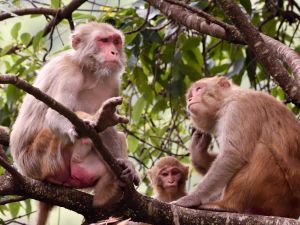
Researchers at the Oregon National Primate Research Center, Oregon Health & Science University, and colleagues elsewhere, forced rhesus macaques to become chronic alcohol drinkers, prior to injecting a test compound into their brains in an attempt to treat alcoholism in people. The current published work (Ford et al 2023), which was approved by the institution's animal use committee, was funded by the US taxpayer through National Institute on Alcohol Abuse and Alcoholism (branch of the National Institues of Health) grants AA024757, AA013510, AA014091, AA010760, AA019431 and AA026117, comprising many millions of US dollars.
According to the authors, eight young-adult male rhesus macaques were recruited
(authors' euphemism) for this latest experiment, a disturbing and inappropriate misrepresentation of the reality to what the monkeys were subjected. The authors further stated that the research complied with relevant ethical regulations
. The macaques were generally singly housed and forced to become alcoholics by lacing their drinking water with increasing concentrations of ethanol. Eventually, the concentration of ethanol in the water was 4% and the macaques were drinking the equivalent of about 9 drinks per day for an average person
, described as binge drinking
. The daily drinking sessions were 21 hours and continued for a period of six months so that the macaques developed heavy drinking patterns
.
Once the macaques were 'heavy drinkers', they were subjected to invasive brain surgery (craniotomies) to inject a test compound. Eight weeks after surgery, the macaques underwent six periods of a month of alcohol access followed by a month of forced abstinence. At the end of this part of the experiment, the macaques were killed (the authors referred to this euphemistically as humanely euthanized
) to get their brains.
The object of this research was to see if the test compound, injected into the brain, would have an effect on the drinking pattern of the macaques. It was found that the treated individuals lost a substantial amount of weight, although they were considered to be within a healthy weight range. The researchers concluded that this treatment was worthy of continued investigation to ensure a beneficial effect while not risking triggering stimulant use disorders or other detrimental behaviors
.
Alcoholism is a devastating human disease, one that is not currently 'curable' by other drugs or surgical interventions. It is also a complex disease, compounded by genetics, socioeconomic issues, psychological factors and more. Imprisoning sentient non-human primates in small cages, forcing them to become chronic alcoholics, forcing them to go through withdrawal and then killing them, is an incredibly immoral and scientifically unreliable means of trying to find a treatment for people. The millions of tax dollars being wasted each year making non-human primates addicted, with a 'pie-in-the-sky' hope that a 'magical cure' will be achieved at some unknowable point in the future, would be put to far better use in helping people who are in need today. Other scientists working in the area of substance abuse agree that addiction in humans is a complex disorder which encompasses psychological, social and emotional variables that are impossible to model in animals
(Magliaro & Ahluwalia 2022) and that non-human primates are inappropriate to use, not only for reasons of morality, but also because they cannot be considered 'normal' when they are in a laboratory (Lahvis 2023; Sapolsky 1993) and because of substantial differences, not only from humans, but also between species (Petticrew & Smith 2012).
The public are repeatedly told that non-human primates are used in research only when absolutely necessary and only when there are no other alternatives available. This shameful experiment, which resulted in substantial suffering – and death – for the monkeys, demonstrates the meaningless nature of such assurances and a lack of commitment to stop using non-human primates. Not only is the information in macaques irrelevant to people given the fundamental differences between the two species, humane and ethical clinical studies have been and can continue to be done on human patients and volunteers in order to get data that are directly applicable to people. The type of compound injected into the rhesus macaques has already been tested in humans (Nutt et al 2003; Pearson et al 2021).
What you can do to help:
References:
We need healthy controls, not psychologically broken ones, to benchmark our disease models. And we need the animals used as disease models to be otherwise healthy because we lack the scientific capacity to separate the biology of a nuanced disorder, like autism or ADHD, from confounding factors like the mental damage caused by incarceration...researchers lured us into believing the ridiculous — that brain development behind steel bars is not only normal but natural enough to be relevant to evolutionary changes occurring outside the lab. Yet their monkeys experienced no full spectrum of color, no natural movement like the rustling of leaves, and no passing landscape...[normalizing] the idea that monkeys naturally live inside telephone booths, not in the vast, dynamic, and aesthetically complex expanses of nature. What bothers me most is that the scientific community expresses so little concern about whether we're chasing artifacts of confinement.
...the impact of social, psychological and economic factors that determine the onset and persistence of addiction (and recovery from it) in humans. Indeed, the predictive validity of animal models of addiction is poor, with few effective treatments deriving from animal studies. ...the principal argument against animal experiments in the field of substances of abuse is that addiction in humans is a complex disorder which encompasses psychological, social and emotional variables that are impossible to model in animals.
Primatologists themselves have warned repeatedly about over-generalising from primate data to human societies...the data may not even be generalisable between similar species of monkey, as comparative research and field studies suggest that there are striking differences in group composition, social spacing, dominance and aggression between species...The social and hierarchical behaviour of Macaca fascicularis, the species used in many of these studies, may not therefore even be representative of all of its own genus, which raises doubt about extrapolation to higher primates.
Please refer to the original paper for full quotes and context of this paraphrasing:it may be questioned whether animal models can ever truly mimic human psychiatric disorders...primates, with their complex social lives, cognitive skills, and emotional nuances, have been particularly attractive objects of psychiatric research interest...The problem arises from the circuitous and often tragic routes by which primates come to find themselves in laboratories...This necessitates a lengthy and traumatic transport of primates...[deaths or illness during transport] at least partially reflect the immunosuppressive effects of the stressfulness of capture and transport...survivors (and their descendents) may be the most physically and psychiatrically robust of individuals, or may, alternatively, remain permanently weakened or damaged by these vicissitudes.
Craniotomy is a surgical procedure to access the brain. Typically, an area on the head is shaved. An incision is made through the skin and tissues underlying it, down to the surface of the skull, in such a way as to create a flap that can be pulled away to expose the skull. Depending on what type of access to the brain is required, holes may be drilled through the skull into the brain cavity, for example for injections, or a portion of the bone may be cut out in order to implant a bank of electrodes. When done, bone cement may be used to fill in the hole in the skull and the overlying tissues sutured.
Information on NIH grant support (funding) is taken verbatim from the relevant publication. If you have difficulty with any links provided, you can do your own search through the NIH RePORTER site: https://reporter.nih.gov/, by copying and pasting the grant number into the Search field on the form.
Be aware that some grants include funds that are for work other than what we report here.
29 August 2023: Urgent: Contact your MP about animal cruelty content and the Online Safety Bill
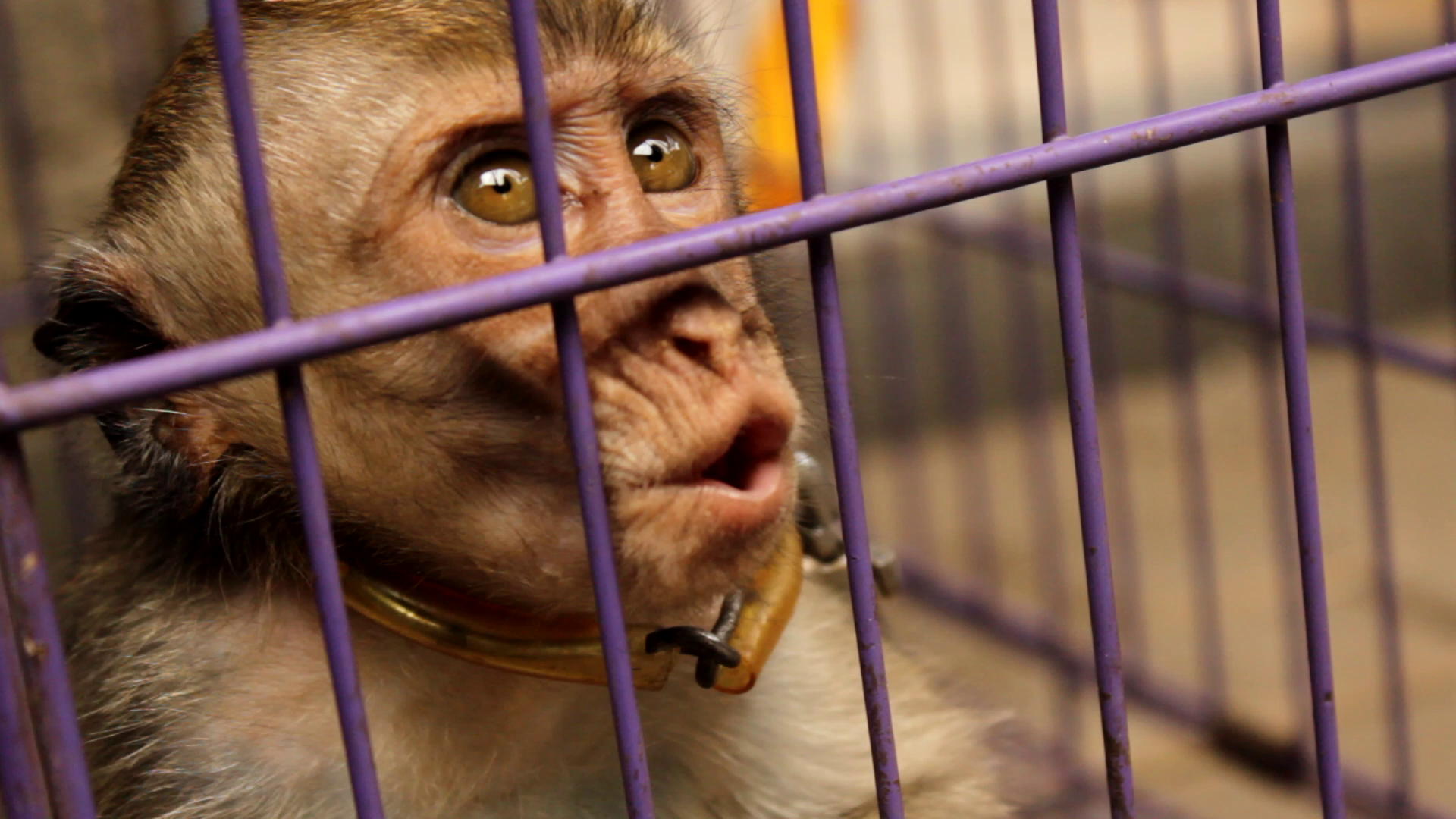
The Online Safety Bill is due to have its Third reading in the House of Lords on 6th September 2023, before it goes back to the House of Commons for consideration of the amendments voted through by the House of Lords. If you are a resident in the UK, we urgently need you to contact your MP asking them to vote to retain clause 64 within the Online Safety Bill, as amended by the House of Lords. This important amendment – which will tackle animal torture and online content – was tabled by Baroness Merron and Lord Clement-Jones, and requires the Government to review whether offences under the Animal Welfare Act 2006 (the main Act under which animal cruelty offences occur) can take place online, and to add them to schedule 7 as priority illegal content if so. The Review would also decide whether the sending of a communication to encourage or assist an act of animal torture, or share content related to animal torture on a regulated service, constitutes an offence under the Communications Act 2003.
The availability of animal torture videos, including those involving baby monkeys, on the Internet was raised by Baroness Hayman of Ullock during the House of Lords Oral Questions on 27 June 2023. This followed the release of the BBC documentary, The monkey haters, which documented severe animal cruelty being shared on social media. The documentary received worldwide attention, including reports on the arrest and release under investigation of three people in the UK, suspected of being members of a 'monkey torture group' involved in the production and distribution of animal abuse content on social media. This put the UK in the spotlight, and demonstrated the shocking escalation in extreme animal cruelty content that is now widely available on social media platforms, and easily accessible by children and vulnerable adults.
Over the past two years, Action for Primates has been working with other animal protection, wildlife and anti-trafficking organisations from the UK and across the globe, including the Wildlife and Countryside Link, the largest environment and wildlife coalition in England, and the Asia for Animals Coalition (SMACC) to push for animal cruelty content to be brought within the scope of the Online Safety Bill.
During the passage of the Online Safety Bill through the House of Lords, we were encouraged that an amendment mentioning animal welfare was added by the Government. This amendment (172) recognises content that depicts violence against non-human animals as priority content that is harmful to children, and will require social media companies to protect children against such content. It defines content that depicts 'real or realistic serious violence against an animal' or 'real or realistic serious injury of an animal' as 'priority content' within the Bill.
We are now urging Members of Parliament to vote for the retention of clause 64 within the Online Safety Bill, as amended by the House of Lords, and to also extend this review to include animal welfare and wildlife trafficking offences within schedule 7.
What you can do to help:
21 August 2023: Inhumane monkey brain research considered ethical
at Cambridge University
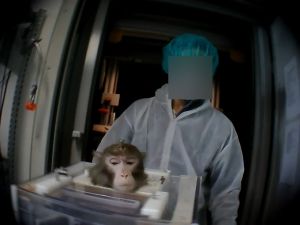
Neurophysiological research is one of the most controversial areas in which non-human primates are used. It involves highly invasive surgery (craniotomies) to implant head posts into skulls and recording devices and electrodes into the brains; extreme physical restraint using devices euphemistically referred to as 'chairs', with further restraint by the neck or head using the implanted posts; water deprivation (often euphemistically termed fluid or liquid control) to 'motivate' the individuals to 'cooperate' and 'perform' during the multiple hours of testing the individuals must endure, as they look at computer screens or push levers while recordings from their brains are taken. An individual may be subjected to such research for years.
Researchers at the University of Cambridge, UK, in collaboration with another at the California Institute of Technology, US, and funded by the Wellcome Trust and the European Research Council, have provided a step-by-step guide on how to carry out such neurophysiological experiments in non-human primates (Pastor-Bernier et al 2023). It is a disturbing account of the controlled, pitiful and wasted lives of non-human primates incarcerated in laboratories, individuals who are highly intelligent and sentient beings. The publication states that this approach is an ethically
acceptable way of obtaining data and refers to monkeys as sentient and precious animals
. The latter statement is seen to be disingenuous as the researchers then describe in detail how to reduce these precious animals
into little more than machines that could be tinkered with or altered in any way desired.
The methods described involve numerous anaesthetic and surgical procedures to cut into the skull of monkeys in order to implant a head holder (a post that holds the monkey's head in a fixed position facing a computer screen), and electrodes into the brain for recordings. Also provided are descriptions of how to restrain the monkeys (primate chair
) and ensure their cooperation
using techniques such as fluid control
. It is acknowledged that some experiments may require monkeys having to carry out hundreds of trials for hours each day.
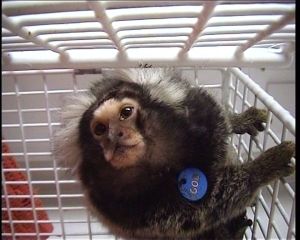
Two statements in particular provide an insight into this type of cruel research. It was stated that the use of fluid control
and fluid rewards was the best way to get the monkeys to 'cooperate'. The researchers, however, cautioned that fluid control can be an issue for ethical committees and personnel unfamiliar with its practicalities
. Although they recommended using long-tailed or rhesus macaques, they advised that the common marmoset...generates less antivivisectionist interest
, so that species could be used for some of the research.
In addition to the highly invasive and inhumane recommendations for non-human primates, the researchers also described in detail how to do the same types of experiments in humans (but without the invasive brain surgery and extreme restraint, which they considered to be unethical, but did not explain why it was ethical if done to equally sentient non-consenting beings – their sentient and precious animals
). Incongruously, they stated that their work was approved and supervised by...the UK National Centre for Replacement, Refinement and Reduction of Animal Experiments (NC3Rs)
. Further, Wellcome Trust, one of the agencies funding the research, state the research must meet the 3Rs standards
. Given that the same information, in its essence, was to be derived from the human volunteers, we fail to understand how the monkey research could have been approved.
Not only was the publication advocating extremely inhumane treatment of non-human primates, there was an attempt to couch this with various platitudes of concern for the individuals. It was clear, however, this expressed concern was mainly so that the non-human primates would 'cooperate', without any objectionable behaviour that would interfere with doing the experiments.
There was no introspection on how a non-human primate, fundamentally and inexorably abnormal from being in a completely unnatural environment (Lahvis 2023; Sapolsky 1993), could somehow emulate a human. There was no questioning of how it could be that a monkey mechanically responding to stimuli in order to get food or liquid nourishment, serves to represent what occurs in humans. Brain function in humans can only be determined in humans. The scientific literature is replete with ethical and elegant studies in human volunteers, the results of which have been the key to understanding and managing brain disorders.
The public are repeatedly told that non-human primates are treated humanely and used in research only when absolutely necessary and only when there are no other alternatives available. The University of Cambridge itself claims that they place good welfare at the centre of all our animal research and aim to meet the highest standards
. They also claim that they only use animals in research where there are no alternatives...Our researchers are actively researching alternatives that can be used in place of animals
. Further, they claim that their Animal Welfare and Ethical Review Body ...scrutinises research projects and procedures involving the use of live animals to ensure that the 3Rs – reduction, refinement and replacement – have been adequately applied and retrospectively review research projects with this in mind. This committee is proactive in the promotion of a culture of 3Rs within the University community, ensuring effective experimental design, and promotes awareness of alternatives where available
.
This shameful publication, which provides a how-to guide in causing substantial suffering for non-human primates, demonstrates the meaningless nature of such assurances and a lack of commitment to stop using non-human primates. The information in non-human primates is irrelevant to people given the fundamental differences between the two species. Other researchers have been critical of the use of non-human primates to 'model' the human (Lahvis 2023; Magliaro & Ahluwalia 2022; McManus 2013; Padrell et al 2021; Petticrew & Smith 2012; Sapolsky 1993).
What you can do to help:
References:
Scientists must believe that lab animals thrive physically and mentally — not for animal welfare reasons, but to justify our experiments. We need healthy controls, not psychologically broken ones, to benchmark our disease models. And we need the animals used as disease models to be otherwise healthy because we lack the scientific capacity to separate the biology of a nuanced disorder, like autism or ADHD, from confounding factors like the mental damage caused by incarceration...researchers lured us into believing the ridiculous — that brain development behind steel bars is not only normal but natural enough to be relevant to evolutionary changes occurring outside the lab. Yet their monkeys experienced no full spectrum of color, no natural movement like the rustling of leaves, and no passing landscape...[normalizing] the idea that monkeys naturally live inside telephone booths, not in the vast, dynamic, and aesthetically complex expanses of nature. What bothers me most is that the scientific community expresses so little concern about whether we're chasing artifacts of confinement.
...the impact of social, psychological and economic factors that determine the onset and persistence of addiction (and recovery from it) in humans. Indeed, the predictive validity of animal models of addiction is poor, with few effective treatments deriving from animal studies. ...the principal argument against animal experiments in the field of substances of abuse is that addiction in humans is a complex disorder which encompasses psychological, social and emotional variables that are impossible to model in animals.
[Elias A. Zerhouni, M.D., NIH Director 2002-2008]: "We have moved away from studying human disease in humans," he lamented. "We all drank the Kool-Aid on that one, me included." With the ability to knock in or knock out any gene in a mouse—which "can't sue us," Zerhouni quipped—researchers have over-relied on animal data. "The problem is that it hasn't worked, and it's time we stopped dancing around the problem...We need to refocus and adapt new methodologies for use in humans to understand disease biology in humans.
Primatologists themselves have warned repeatedly about over-generalising from primate data to human societies...the data may not even be generalisable between similar species of monkey, as comparative research and field studies suggest that there are striking differences in group composition, social spacing, dominance and aggression between species...The social and hierarchical behaviour of Macaca fascicularis, the species used in many of these studies, may not therefore even be representative of all of its own genus, which raises doubt about extrapolation to higher primates.
Please refer to the original paper for full quotes and context of this paraphrasing:it may be questioned whether animal models can ever truly mimic human psychiatric disorders...primates, with their complex social lives, cognitive skills, and emotional nuances, have been particularly attractive objects of psychiatric research interest...The problem arises from the circuitous and often tragic routes by which primates come to find themselves in laboratories...This necessitates a lengthy and traumatic transport of primates...[deaths or illness during transport] at least partially reflect the immunosuppressive effects of the stressfulness of capture and transport...survivors (and their descendents) may be the most physically and psychiatrically robust of individuals, or may, alternatively, remain permanently weakened or damaged by these vicissitudes.
Craniotomy is a surgical procedure to access the brain. Typically, an area on the head is shaved. An incision is made through the skin and tissues underlying it, down to the surface of the skull, in such a way as to create a flap that can be pulled away to expose the skull. Depending on what type of access to the brain is required, holes may be drilled through the skull into the brain cavity, for example for injections, or a portion of the bone may be cut out in order to implant a bank of electrodes. When done, bone cement may be used to fill in the hole in the skull and the overlying tissues sutured.
13 August 2023: Egyptair resumes transporting monkeys for research and testing industry; hundreds of monkeys exported from Mauritius

Action for Primates has learnt that Egyptair has resumed transporting monkeys for the research and toxicity (poisoning) testing industry. This disturbing discovery was recently brought to the attention of Action for Primates by a concerned worker at JFK airport. During 4th-5th August (2023), 977 long-tailed macaques were exported from Mauritius: 521 transported by Egyptair to JFK airport via Cairo (Airway Bill numbers: 077-5092 6271 and 077-50926282) – despite the airline announcing in June 2022 that it had stopped transporting monkeys – and 456 transported by MNG Airlines, a Turkish cargo carrier (AWB: 716-97562371) to JFK airport via Djibouti and Istanbul. These monkeys were transported as cargo, singly in small crates, and subjected to a traumatic ordeal enduring a journey of around 20 hours flying time, and several more hours on the ground during stop-overs. This did not include the hours spent being unloaded and transferred to and from airports.
Action for Primates has joined with People for the Ethical Treatment of Animals, One Voice and Abolición Vivisección to renew our campaign against Egyptair, calling on the airline to honour its 2022 commitment by immediately and permanently ending all transportation of monkeys to laboratories. We are also calling on MNG Airlines to stop their involvement in this cruel trade.
What you can do to help (for more information on the issue, see below):
The welfare issues surrounding the shipping of non-human primates are substantial. Studies carried out by scientists from within the research industry itself have shown that transportation causes profound negative effects on the behaviour and welfare of non-human primates (Fernström et al 2008; Honess et al 2004; Schapiro et al 2012). Monkeys are transported as cargo in crates that are too small to permit normal postural adjustments nor any exercise. Most importantly, the monkeys are not allowed direct contact with others, something critical for their welfare and well-being, especially under such unnatural and stressful conditions such as transportation. Further, they may have to endure inadequate ventilation, noise, extreme temperature fluctuations and delays en route. Deaths and illnesses, either during transportation or subsequently, are generally not publicised, but occur regularly. For example, on 15th November 2021, several monkeys were found dead onboard a Wamos Air flight from Cambodia to Houston, USA (Dalton 2021).
The transportation by airlines of non-human primates destined for the research and toxicity testing industry is an issue that invokes strong public concern. Many of the world's leading airlines – including American Airlines, British Airways, United Airlines, South African Airways, Air China, China Airlines, Delta Airlines, Eva Air, Kenya Airways and Air Canada – ended their involvement in this business. Air France is the latest airline to join this list, having announced it was stopping transporting monkeys in June this year. Air France was the main airline transporting monkeys from Mauritius to the USA and Europe.
Reference:
1 August 2023: US imports hundreds of wild-caught monkeys from Indonesia for testing laboratories
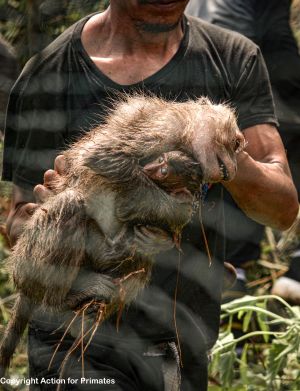
Action for Primates has condemned the importation by the USA of hundreds of wild-caught long-tailed macaques from Indonesia for research and toxicity (poisoning) testing. The data have come to light following a Freedom of Information request, which revealed that, in 2022, the USA imported 990 long-tailed macaques from Indonesia, including 870 who were wild-caught and 120 who were the offspring of at least one wild-caught parent (USFWS 2023).
In 2021, the government of Indonesia allowed the capture and export of wild long-tailed macaques to resume. This was despite widespread global concerns about the inherent inhumanity of trapping wild monkeys and the increasing awareness of the vulnerability of the conservation status of this species. Since this resumption of wild trapping, the conservation status of the long-tailed macaque has been increased to Endangered with a decreasing population trend by the International Union for the Conservation of Nature (IUCN) Red List of Threatened Species (Hansen et al 2022).
In 2022, Action for Primates released harrowing video footage of the capture of wild long-tailed macaques in Indonesia, resulting in worldwide condemnation. The footage provided compelling evidence of the cruelty of the trappers and the suffering inflicted upon the monkeys. This included brutal capture methods and violence against the monkeys, the forced separation of nursing infants from their mothers, and the beating and killing of unwanted individuals. Such brutal and inhumane treatment was a clear breach of international animal welfare guidelines as established by the International Primatological Society (McCann et al).
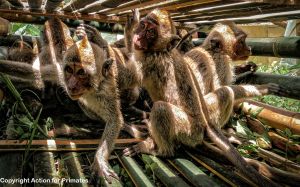
Long-tailed macaques are indigenous to Indonesia, part of the rich and diverse ecosystem, contributing to the country's unique biodiversity. The species, however, is not protected under Indonesian law and, in addition to the capture and export for the global research and toxicity testing industry, its wild populations face many other threats. The threats include hunting for human consumption; capture as 'pets' or to be used in tourism and 'entertainment' activities, including the disturbing rise in baby macaque abuse videos filmed for broadcast on social media; and killing due to negative interactions with people. Long-tailed macaques are the primary non-human primate species used in regulatory toxicity tests, which is the area in which most non-human primates are used. Toxicity (or poisoning) testing is carried out to assess adverse reactions to drugs (or chemicals), and often involves substantial suffering and always ends in death for the monkeys.
As the leading importer in long-tailed macaques, the US is a major player in the global trade, a trade which is having such a devastating impact on the species and its wild populations. The future of these intelligent non-human primates, who play an important role in biodiversity and ecosystems, is seriously under threat. They will continue to be decimated as long as the research industry is allowed to continue importing them.
Action for Primates is calling upon the US government to dissociate itself from this extreme cruelty by banning all imports of monkeys from Indonesia (and other countries). We are also urging the Indonesian government to stop the capture and exportation of wild monkeys for use in laboratories and to enact legislation that offers protection to the indigenous long-tailed macaque population.
What you can do to help:
References:
8 July 2023: Baboons forced into 'alcoholism' and treated with cannabis in US research
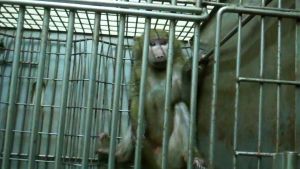
Seven adult male olive baboons (Papio anubis) were acquired from the Southwest Foundation for Biomedical Research, San Antonio, TX. They were referred to as DK, GB, HS, LN, RAF, RS and WI, and were housed singly in cages that also served as experimental chambers. The work was done at the Johns Hopkins University School of Medicine and approved by their Animal Care and Use Committee (Moore et al 2023). Financial support was through public funds through the National Institutes of Health (NIAAA grant AA15971 and NIDA grant DA007209, each involving millions of US dollars).
Olive baboons live and travel in large multi-female, multi-male troops of 15 to 150 individuals and can live up to 30 years. They spend about sixty percent of their time walking and foraging, often for distances over 3 km. In this experiment, the lives of these baboons were severely curtailed by being imprisoned on their own, inside a small metal cage, and used in alcohol addiction research in a crude attempt to mimic the human situation. Their sad and pitiful existence was not even mitigated by any meaningful enrichment according to the authors. There was no direct contact with other baboons, something well known to be critical for the welfare and well-being of social non-human primates such as baboons. Appallingly, the conditions were stated to be in accordance with USDA and AAALAC [Association for the Assessment and Accreditation of Laboratory Animal Care] standards
.
According to the authors of this work, cannabidiol (CBD) is being investigated as a potential treatment for alcohol use disorder. The aim of the baboon research was to examine the behavioral effect of acute and chronic administration of CBD on alcohol-seeking and alcohol self-administration during conditions of ongoing alcohol access in male baboons with long-term alcohol drinking experience
. The experience
to which the authors referred was the result of the baboons being coerced into consuming alcohol by forcing them to drink only alcohol-laced water until they would drink alcohol 'willingly'.
Once the baboons were trained to perform certain tasks while still consuming alcohol, they were given 150-1200 mg of CBD every day to see if this drug would inhibit the use of alcohol and whether it would affect behaviour. It was found that cannabidiol appeared to have no effect, positive or negative, on the baboons. The researchers concluded that cannabidiol was not useful in reducing ongoing alcohol drinking in baboons. The fate of the baboons was not stated.
Although of no 'benefit' to the baboons used in this study, cannabidiol could have beneficial effects on humans with alcohol use disorder. The only way to know for sure is to use human volunteers, in whom the research could be done humanely, ethically and with informed consent, something not afforded the baboons. Furthermore, the baboons did not appear to experience the side effects of cannabidiol use seen in humans. This difference in reaction to drugs between species is not unique and once more demonstrates that using non-human primates as human surrogates is not only immoral, but also scientifically unreliable.
The public are repeatedly told that non-human primates are used in research only when absolutely necessary and only when there are no other alternatives available. This shameful experiment is just one more demonstrating the meaningless nature of such assurances and a lack of commitment to stop using non-human primates. Because humane and ethical clinical studies have been and can continue to be done on human patients and volunteers in order to get data that are directly applicable to humans, the experiment was clearly contrary to the Replacement criterion for the 3Rs to which the research industry states they adhere.
What you can do to help:
Reference:
4 June 2023: Join call to Bluebird Nordic to stop transporting monkeys

On 3rd June 2023, Bluebird Nordic, a cargo airline based in Reykjavík, Iceland, transported hundreds of long-tailed macaques as cargo from Cambodia to Montreal, Canada. The monkeys were subjected to a gruelling ordeal of almost 30 hours – involving four flights with three stop-overs in Delhi, Tbilisi and Reykjavik – imprisoned singly in small transit crates, before Flight BO303 landed at Montréal–Mirabel International Airport. Although the transportation of these sentient and intelligent beings is exceptionally brutal and inhumane, the fate that awaits these individuals is far worse: they will suffer and die or be killed in laboratories, thousands of miles from their homes and families. Bluebird Nordic is the latest airline to become involved in this cruel business.
The conservation status of the long-tailed macaques (Macaca fascicularis) has been recently increased to Endangered by the International Union for the Conservation of Nature (IUCN). Threats facing the species include the global trade for research and toxicity (poisoning) testing. Furthermore, there are specific concerns regarding the trade in macaques from Cambodia. A federal investigation by the US authorities into the global trafficking of long-tailed macaques into the US resulted in charges being filed against Cambodian wildlife officials and others alleging that wild-caught long-tailed macaques imported by US companies were falsely stated to be captive-bred at Cambodian primate facilities.
Action for Primates, together with Abolición Vivisección and One Voice in Europe and PeTA in the US, are calling on Bluebird Nordic to end their involvement in the brutal global trade in monkeys for research and testing, and to join the growing number of airlines, including many of the world's largest, that have stopped transporting monkeys to laboratories.
Please take action for these monkeys, and join our call to Bluebird Nordic to stop transporting monkeys:
31 May 2023: Infant monkeys, deprived of mothers, used in disturbing blue light research in US
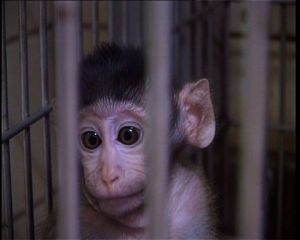
Fifteen infant rhesus macaques were removed from their mothers within a few weeks of being born at an undisclosed location and sent to be used for a research project at the University of Houston (Lou et al 2023). The premise of the research was purported to be concern over what effects on the human retina there might be from blue light from artificial light sources, such as the use of LEDs in domestic lighting and electronic devices, including laptop, tablets and smartphones.
The work was financially supported by public funds through grants EY003611 and EY007551, each comprising several millions of US dollars, from the National Eye Institute, a branch of the National Institutes of Health. Additional funding was also provided by the Brien Holden Vision Institute (Australia). The project was approved by the Institutional Animal Care and Use Committee at the University of Houston. The authors stated that the manner in which they treated the infants conformed with the Association for Research in Vision and Ophthalmology statement on the use of non-human animals in research. That document states that animals should be treated humanely and that the potential benefits to human and animal health outweigh the cost in animal lives
. Action for Primates believes that this project not only represents extreme inhumane treatment of animals, but also fails with respect to benefits to anyone.
The infants were divided into two groups who were exposed to 12 hours a day of either blue light (seven infants) or white light (eight infants) over a 10-month period. The infants were forced to continuously wear a helmet for about 143 days. This helmet would have been alien to the infants, bulky and uncomfortable. It held a lens system, like spectacles, that was in front of the eyes and which altered the quality of vision.
Contrary to good practice and the standard in scientific publications, the authors did not describe the housing system, other than to state cages were used. There was no mention of any enrichment provided to the infants (the only enrichment of meaning to infants a few weeks old would have been the comfort of their mothers, something conspicuously denied them). It is, however, likely that each infant was kept by her or himself in a cage without direct contact with anyone else. If the infants were not housed singly, it is likely they would have interfered with each other's helmets.
At about 330 days, the infants were anaesthetised and an attempt was made to obtain recordings made from each eye. In some cases, some monkeys began to wake up before left eye
recordings were completed, making data acquisition incomplete. These recordings were compared with those made from a different group of juvenile individuals.
One can only imagine the despair and psychological trauma these infants endured, scared and without their mothers, in frightening conditions. No information was provided as to the ultimate fate of the infants, although it is certain that they will face a lifetime of continued use as research 'subjects' and die or be killed at some point. They will never get to be with their mothers again, and never get to experience a normal life in freedom. Sad experience shows that these infants will also be emotionally scarred, perhaps for life, due to the effects of being deprived of their mothers. Given the social structure of most non-human primate species, subjecting the young of these individuals to maternal deprivation results in severe compromise of their welfare and well-being, including death.
Used as mere 'tools' to get the information desired, not only were the conditions to which these infants were subjected completely unnatural, there is no evidence that the information gained will be of any use to humans. The authors stated at the outset that there is no evidence that blue light at normal indoor levels damages the human retina
. They even provided evidence to this effect by citing a study of the effects of blue light on the human retina (O'Hagan et al 2016), in which no negative effects were demonstrated. Furthermore, the authors used the accepted American National Standard guidelines for safe human exposure in designing this experiment. Even if one set aside the immorality of doing such research on non-consenting beings – the infant rhesus macaques – it appears that the information needed to 'protect' humans was already widely known. As such, the authors' conclusion that long-term rearing in blue light does not affect ERG responses in young rhesus monkeys
is of no use to understanding human retinal function.
The public are repeatedly told that non-human primates are used in research only when absolutely necessary and only when there are no other alternatives available. This shameful experiment, which resulted in substantial suffering for the monkeys – and which might be life-long – demonstrates the meaningless nature of such assurances and a lack of commitment to stop using non-human primates. Not only is the information in macaques irrelevant to people given the fundamental differences between the two species, humane and ethical clinical studies have been and can continue to be done on human patients and volunteers in order to get data that are directly applicable to people. The infant macaques in this study had to endure the stress of captivity, maternal deprivation and virtual social isolation, clearly contrary to the Replacement criterion for the 3Rs.
Please let those responsible for this extremely inhumane research know of your concerns:
Research cited:
Lou, Linjiang; Frishman, Laura J.; Beach, Krista M.; Rajagopalan, Lakshmi; Hung, Li-Fang; She, Zhihui; Smith, Earl L. and Ostrin, Lisa A. 2023-03-30 Long-term blue light rearing does not affect in vivo retinal function in young rhesus monkeys Documenta Ophthalmologica
24 May 2023: Urgent appeal to Hi Fly Malta to stop cruel monkey flights
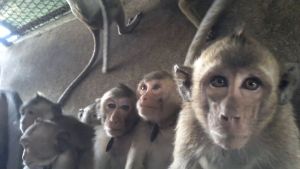
Action for Primates has been alerted to a new airline involved in the transportation of non-human primates for the global research and toxicity (poisoning) testing industry. A concerned airport worker has reported that in early May 2023, Hi Fly Malta transported hundreds of long-tailed macaques from Cambodia to Canada. Violently removed from their families and social groups, these intelligent and sentient individuals had to endure the trauma of a frightening and unfamiliar environment, as they were shipped thousands of kilometres across the world. Hi Fly Malta is a Maltese charter airline, and a subsidiary of the Portuguese charter airline Hi Fly. Action for Primates has joined forces with PeTA, One Voice and Abolición Vivisección in an appeal to Hi Fly to end its involvement in these flights of misery. A letter raising our concerns sent to Mr Paulo Mirpuri, President and Chief Executive Officer of Hi Fly, has so far gone unanswered.
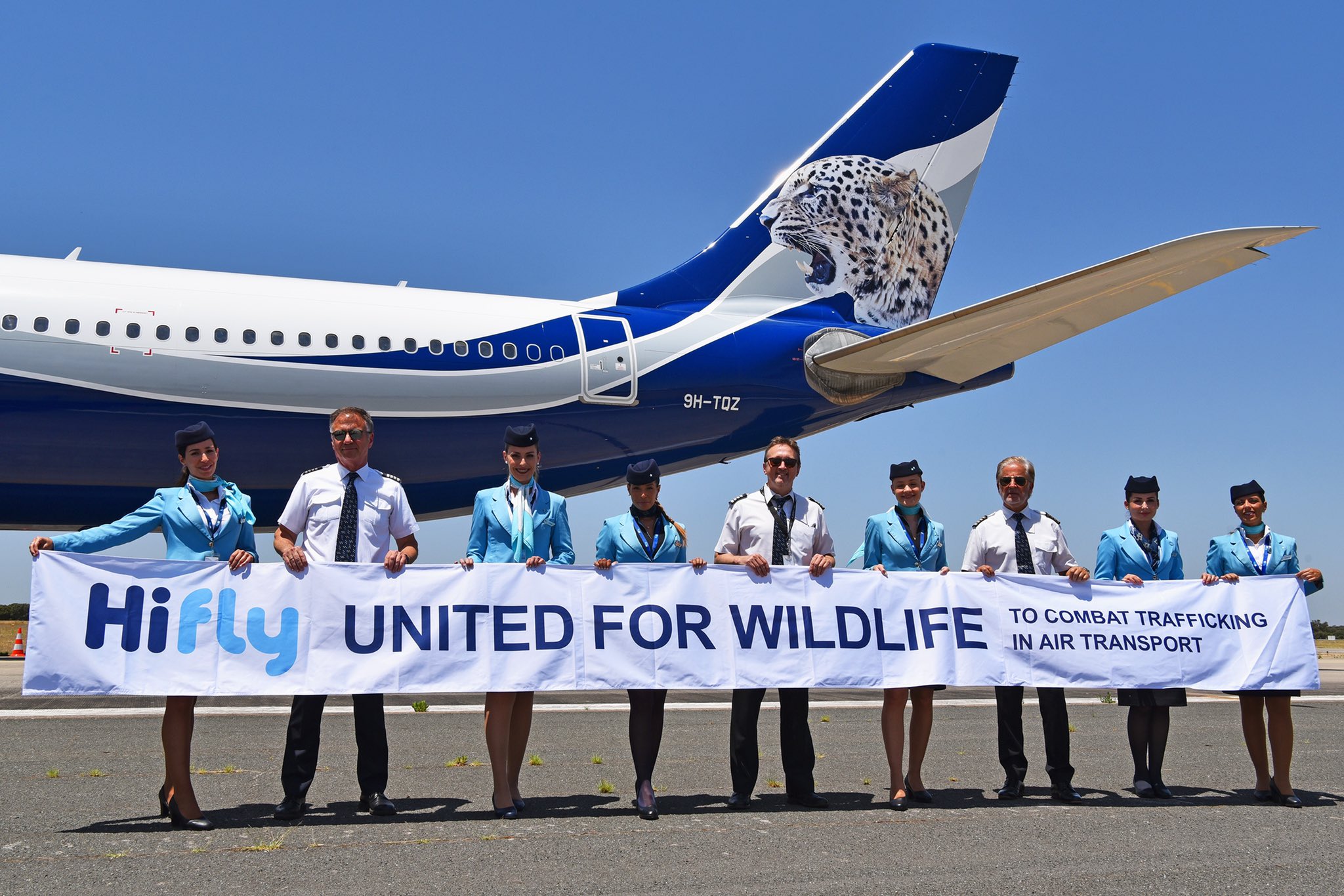
Hi Fly has made bold statements in support of wildlife conservation and its efforts to combat wildlife trafficking. The conservation status, however, of the primate species Hi Fly is transporting – long-tailed macaques (Macaca fascicularis) – has been assessed as Endangered by the International Union for the Conservation of Nature (IUCN). Furthermore, there are specific concerns regarding the trade in macaques from Cambodia. A federal investigation by the US authorities into the global trafficking of long-tailed macaques into the US for research and testing, resulted in charges being filed against Cambodian wildlife officials and others alleging that wild-caught long-tailed macaques imported by US companies were falsely stated to be captive-bred at Cambodian primate facilities.
Following widespread global public concern and opposition, a growing number of airlines, including many of the world's largest, have stopped transporting monkeys to laboratories. Public opposition to experiments using non-human primates is growing around the world. Such opposition is also being expressed by a growing number of scientists. We hope Hi Fly will align its actions and policies with those of other major airline companies, as well as its highly publicised ethical principles, by stopping its practice of transporting monkeys to laboratories.
Please take action for these monkeys, and join our call to Hi Fly to stop transporting monkeys:
22 May 2023: Legislation to ban use of non-human primates in entertainment introduced in New York
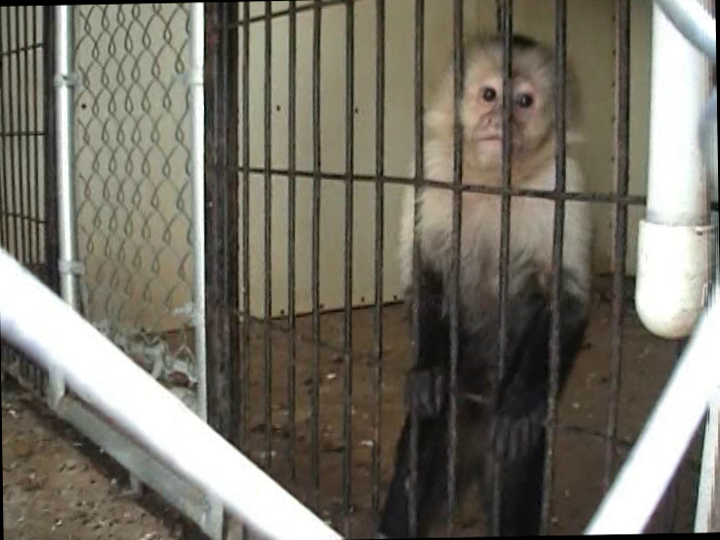
Action for Primates is grateful that New York, US, is now considering legislation, introduced by Sen James Skoufis (D-New Windsor), to ban the use of non-human primates in 'entertainment acts' at carnivals and fairs, such as 'banana races', during which capuchins are tied onto the backs of dogs racing around a track. If passed, this would be consistent with all reputable non-human primate and veterinary medical organisations, none of which support using these individuals in any entertainment venues.
Not only is using non-human primates in 'entertainment' incredibly cruel, it also represents a serious public health risk, from transmission of infectious diseases to serious bodily injury from attacks by the confused and abused primates. This practice should be banned universally and we hope New York will do the right thing and pass this legislation.
New York residents, please write to your legislators and ask them to support and co-sponsor Sen Skoufis' bill:
17 May 2023: Rhesus macaques subjected to lethal radiation and allowed to die
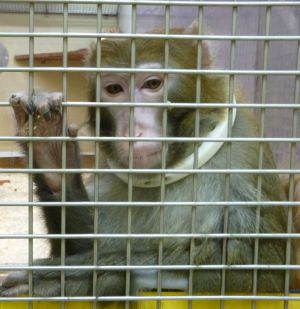
In this incredibly inhumane experiment, 36 female and male rhesus macaques were subjected to whole body irradiation that was known to be lethal (Singh et al 2022). The work was done by Uniformed Services University of the Health Sciences researchers at the University of Maryland Baltimore. It was approved by animal use committees at the Armed Forces Radiobiology Research Institute, University of Maryland Baltimore and Department of Defense, and supported by public funds through the National Institute of Allergy and Infectious Diseases (grant AAI12044-001-07000).
The macaques were anaesthetised and exposed to six different doses of total-body irradiation. Although some medical management was done, the authors stated The animals were observed for 60 days postirradiation to score survivors.
(emphasis added) During this period, each macaque was restrained using the inhumane pole-and-collar method
and placed into what was euphemistically termed a chair
in order to collect blood. By being housed singly in stainless steel cages, they were not even allowed the meaningful social enrichment that is critical to non-human primate welfare and well-being. If a macaque became moribund
(down and unresponsive), he or she was euthanized
. But, as the authors pointed out, The primary endpoint was mortality since the objective of this study was to determine the lethality
of the radiation. The degree of illness and suffering endured by the macaques was substantial and included:
Even though many of these conditions are severe and constitute extreme compromise of welfare and well-being, an individual macaque had to be experiencing more than one of these before the researchers even discussed whether the individual's suffering should be ended. Instead, the macaques were allowed to suffer until they either developed other conditions in the list or died.
The authors stated that This study was carried out in strict accordance with the recommendations in the Guide for the Care and Use of Laboratory Animals...
. Furthermore, the University of Maryland claims that it ensures humane care
of the non-human animals under its care (UMD Baltimore 2023). Given the extreme degree of suffering imposed upon the macaques under its care, the use of the word humane
is meaningless.
The public are repeatedly told that non-human primates are used in research only when absolutely necessary and only when there are no other alternatives available. This shameful experiment, which resulted in substantial suffering and death for the macaques, demonstrates the meaningless nature of such assurances and a lack of commitment to stop using non-human primates. Furthermore, the results of this research cannot be uncritically applied to the human situation and we already have substantial data from unintended human exposure (CDC 2018) and can continue to obtain data from accidental exposures.
What you can do to help end such inhumane research:
Reference:
Pole and collar refers to placing a permanent metal collar around the neck of the individual. The collar has openings which can be 'grabbed' by the end of a specially designed pole. The individual then can be dragged around by the neck until they acquiesce to being manoeuvred in this manner. Almost all individuals vigorously object to being treated in this manner and it can take many weeks for them to acquiesce. Some become too aggressive for this method to be used.
The use of the word euthanized
is a misnomer in this context. Euthanasia is not simply ending a life for humane reasons, generally with the consent of the individual. Fundamental to this is that the individual ending the life is not also the one who caused the situation in the first place. To claim you are 'euthanising' someone after your treatment of them caused them to be so ill that death is the only humane option, is morally bankrupt.
9 May 2023: Call on Malaysia to act against torture of baby monkeys for online 'entertainment'
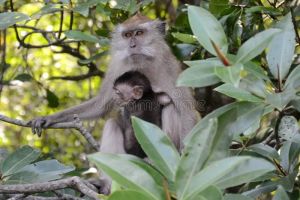
Lady Freethinker and Action for Primates have written to the Attorney General in Malaysia, appealing to him to reconsider a decision not to take action over the horrific torture and killing of baby monkeys on camera for online 'entertainment'. Footage of the cruelty filmed in Malaysia includes some of the most horrifying and sadistic abuse that has been posted on private platforms, as well as social media platforms such as Facebook. Lady Freethinker and Action for Primates have been investigating the active and vocal monkey hatred community on private online groups and social media platforms such as YouTube and Facebook.
Action for Primates and Lady Freethinker are working with Lawyers for Animal Rights and Pertubuhan Hak Asasi Hidupan Liar Malaysia (Hidup). In January 2023, Hidup filed a report with the police. This dossier of information included harrowing evidence against an individual in Malaysia identified as being responsible for making videos of himself while he tortured and killed baby monkeys to distribute online in "monkey torture groups". The monkeys being abused were long-tailed macaques, captured from the wild, a native non-human primate species protected according to the Malaysian Wildlife Conservation Act of 2010. Despite the evidence, the report was classified as "No Further Action (NFA)" by the public prosecutor. This decision must be challenged and those responsible for such cruelty must be held to account. We believe strongly that this will act as an important deterrent to others taking part in such appalling behaviour.
Please join Lady Freethinker and Action for Primates in calling upon the authorities to reconsider this alarming decision:
27 April 2023: Wild-caught monkeys on St Kitts cruelly subjected to spinal cord injuries causing leg paralysis
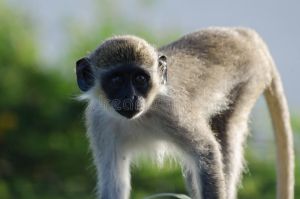
Green monkeys (Chlorocebus sabaeus, also known as vervets) have lived freely in the popular Caribbean holiday destination of St. Kitts and Nevis for hundreds of years. Tragically, many of them are exported for research and testing, primarily to the US, including those who have been captured from the wild. Between 2020-2021, St. Kitts and Nevis reported exporting 1,477 individuals, the majority of whom (1,126) were wild caught and sent to the US, although some were also imported by France (CITES Trade Database).
In addition to being exported, green monkeys are also captured from the wild to suffer and die in research taking place on St. Kitts itself. In one such recently published cruel experiment, carried out at the St. Kitts Biomedical Research Foundation and translational research affiliate Virscio, green monkeys were subjected to very invasive and destructive spinal cord surgery, and suffered greatly as a result, including from pain, loss of leg function and pressure sores (Jacobson et al 2021). At least 21 individuals died or were killed before the end of the experiment due to serious problems such as brain swelling during surgery, failure of the surgery, unintended damage to the spinal cord during surgery (but not evident until after recovery from surgery), pressure sores, unintended functional deficits of the leg and septic shock. All surviving individuals were killed for microscopic study.
According to the authors, the research was carried out in accordance with the Guide for the Care and Use of Laboratory Animals and the Institutional Animal Care and Use Committee
of the facility. Funding was through AbbVie, a pharmaceutical research and development company. Many of the authors were paid employees or paid consultants of the company and may own AbbVie stock. The authors were from the US, Canada, Germany and Switzerland.
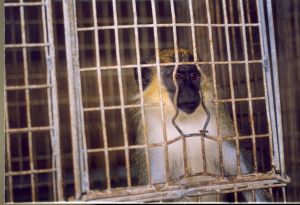
It appears that at least 88 wild green monkeys were abducted from their homes on St. Kitts for this inhumane research project. They were estimated to be 4-10 years of age and were conveniently dismissed by the authors as an invasive species
as though that would somehow justify their use and make criticism of the work unlikely. Adding to the extreme cruelty of being captured from the wild, all the monkeys were housed singly, without any meaningful social contact which they had enjoyed moments before being trapped.
Under anaesthesia, laminectomy (surgery in which part or all of the vertebral bone is removed) was carried out, involving a skin incision followed by exposure of the monkeys' spinal column, then cutting away part of the vertebra. An infusion apparatus was implanted intrathecally (into the cerebrospinal fluid space). Access to this apparatus was through a port under the skin of each monkey's back. Another laminectomy was done some time later at a different site and the spinal cord was sliced through vertically and a clip was implanted to later provide compression of the spinal cord. A test drug, Elezanumab – a human anti-RGMa monoclonal antibody – was given intravenously to some of the monkeys.
The surviving monkeys had to walk on a treadmill to assess locomotor function while recordings were made. They were held inside a enclosed treadmill chamber and forced to walk for up to 20 minutes, with different degrees of spinal cord impairment, on the treadmill which was brought from a stop to 1.5 - 3 mph speeds (slow and fast walking speeds). The test drug was used to see the effects on this. This research went on for at least six months.
As is typical for researchers, sanitised and misleading language was used in the published work. Euphemistic terms such as animal recruitment
and enrollment in studies
made it sound like the monkeys somehow applied for the role or were similar to human subjects in other research. Such language attempts to mask the full horror of what the monkeys were subjected to and what they experienced. It also ignores the fact that the monkeys were unwilling and non-consenting whereas these principles underpin the core of research using human volunteers.
What you can do to help:
References:
17 April 2023: Urge Sri Lanka to not export 100,000 monkeys to China
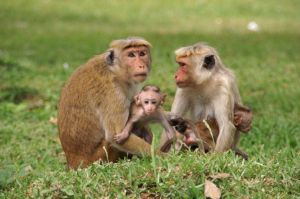
There has been widespread alarm amongst animal protection and wildlife groups, including Action for Primates, following the announcement that Sri Lanka is considering exporting 100,000 toque macaques to China. According to news media reports, China has made a request for the macaques allegedly for 'display' in its Zoos! It is suspected, however, that the purpose for the export is more sinister, and that China wants to either use the monkeys for research and toxicity (poisoning) testing or kill them for human consumption. Regardless of the true reasons for the request, the macaques would be sent to a country in which animal welfare standards are poor with appalling conditions and disturbing treatment of animals.
Wildlife and environment groups in Sri Lanka have spoken out against the proposal to export the country's indigenous macaques, and include Wildlife & Nature Protection Society (WNPS), Centre for Environmental Justice (CEJ),
Federation of Environmental Organizations (FEO) and Rally for Animal Rights and Environment (RARE).
Reportedly, Sri Lanka legislation would only allow export of the monkeys for conservation purposes. A special meeting, however, was held by officials from the Sri Lankan Ministry of Agriculture, the National Zoological Department and the Wildlife Department to discuss the request from China and it was agreed to set up a committee to study the legal aspects of the situation. It has been alleged that Sri Lanka is considering this request because the country is suffering a financial crisis, and China is one of Sri Lanka's biggest bilateral lenders.
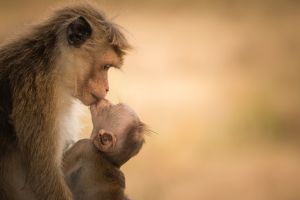
Toque macaques (Macaca sinica), who are native to Sri Lanka, are assessed as Endangered by the International Union for Conservation of Nature (IUCN) Red List, with a decreasing population trend. Threats to the species include habitat destruction, killing and persecution due to crop foraging and increasing human-wildlife negative interactions. Forests have been lost and fragmented, resulting in the shrinking of macaque habitat and human encroachment into areas originally occupied by monkeys. Despite concerns for the conservation status of the macaque, the species is not on the list of protected species in Sri Lanka. Critically, there has been no recent population surveys carried out, so there are no accurate data on the population of the macaques. According to the IUCN assessment: Towns, tourist and temple provides macaques access to human foods and this has developed into concentrations of conspicuous pest macaques at these sites. These sites are highly localized and do not represent macaque population numbers countywide.
Negative interactions between non-human primates and people are essentially always due to human activity. A major factor is human population growth and the expansion into and destruction and fragmentation of native habitat, forcing non-human primates to compete with people over land and resources. It is imperative that authorities do not resort to killing, but instead adopt humane and effective methods that can prevent or resolve problems.
Further information: Monkey Business: Sri Lanka To Export 100,000 Toque Macaque Monkeys To China: A Critical Review Of Implications.
Please join Action for Primates in speaking up for these monkeys. We must try to convince the Sri Lankan authorities that trapping and exporting the macaques is unacceptable and inhumane, and that any underlying reasons for considering this should be resolved in humane and effective ways.
What you can do to help:
15 April 2023: Call for US to add long-tailed and pig-tailed macaques to Endangered Species List
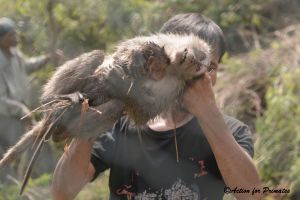
Action for Primates has joined PeTA (People for the Ethical Treatment of Animals) in urging US Fish and Wildlife Service (FWS) to immediately include long-tailed and pig-tailed macaques under the federal Endangered Species Act (ESA). Formal rulemaking petitions have been submitted by PeTA and supported by more than 30 wildlife and scientific organisations from around the world, including leading primatologists Dr Jane Goodall and Dr Birutė Galdikas.
The long-tailed macaque (Macaca fascicularis) and southern pig-tailed macaque (Macaca nemestrina) have been elevated from Vulnerable to Endangered on the International Union for Conservation of Nature (IUCN) Red List of Threatened Species. Both species are widely exploited and face multiple threats, including their trade for research and toxicity (poisoning) testing; hunting to be kept as 'pets', for human consumption and to be abused for 'entertainment' as online social media content; as well as their persecution and killing because of negative interactions with people. These, together with ongoing habitat destruction, are decimating wild populations of macaques.
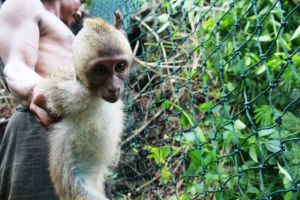
The long-tailed macaque is the most heavily traded non-human primate species and the most widely used by the global research and toxicity (poisoning) testing industry. Captured from the wild in SE Asia and Mauritius for breeding facilities or direct exportation, tens of thousands of macaques are shipped across the globe every year. Harrowing video footage released by Action for Primates recently revealed the shocking capture of wild long-tailed macaques in Indonesia. As the leading importer of long-tailed macaques, the US is a major player in this global trade, a trade which is having a devastating impact on the species and its wild populations. There has been a major investigation by the US authorities into the global trafficking of long-tailed macaques into the US for research and testing. As a result, charges were filed alleging that wild-caught long-tailed macaques imported by US companies were falsely stated to be captive bred at Cambodian facilities. This demonstrates and reaffirms the vulnerability of and threats faced by this non-human primate species by a multi-billion dollar industry.
The US animal experimentation industry's voracious demand has nearly emptied the forests of these keystone species,
says PeTA primate scientist Dr Lisa Jones-Engel. PeTA urges the FWS to step up and protect these primates before we lose them completely.
The future of these intelligent non-human primates, who play an important role in biodiversity and ecosystems, is seriously under threat. Given that human beings are the cause of this threat, we have a moral obligation to act now – before it is too late – to protect and ensure a future for long-tailed and pig-tailed macaques. Please join PeTA, Action for Primates and others in calling on the US Fish and Wildlife Service to include long-tailed and pig-tailed macaques under the federal Endangered Species Act (ESA).
What you can do to help:
31 March 2023: Rhesus macaques once again used in invasive cannabis research
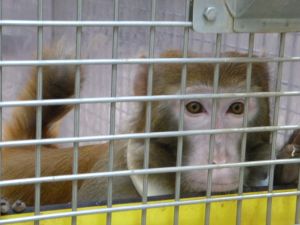
Six male rhesus macaques who had previously been coerced into eating cannabis (THC or tetrahydrocannabinol – the main psychoactive ingredient in cannabis) every day to study the effects on reproductive health in men, have now been subjected to more procedures at the Oregon National Primate Research Center, Oregon Health & Science University (OHSU) (Hedges et al 2023). Not satisfied just with forcing these individuals to become chronic users of cannabis, the researchers discontinued the drug and subjected the macaques to numerous manipulations to see if stopping the drug had an effect on sperm. The macaques were subjected to repeated removal of blood, ultrasound of their testicles and electroejaculation while conscious. They also were anaesthetised repeatedly in order to cut into the testicles to get tissue. All this was once again approved by the Oregon National Primate Research Center Institutional Animal Care and Use Committee and conformed to all applicable regulations
.
The researchers reported that this ...is the first study demonstrating that discontinuation of chronic THC use in rhesus macaques partially restores adverse impacts to male reproductive health...
. They did not, however, demonstrate whether during earlier daily THC administration or after cessation of the drug, the macaques were capable of reproduction. Exploiting macaques in this way for what is primarily a recreational drug is morally reprehensible. Further, there is no way to know whether any of this information in the macaques has any relevance to male humans. But, there is no need to know this because cannabis use is widespread and has been so for many years and can easily – and humanely – be studied in people. We also know that common sense and physician advice is for people to discontinue all drug use if they are trying to conceive or when they become pregnant. The millions of dollars of public grant money received by these researchers could have been used to study human cannabis users and provide vital information to help them directly. Although there are already published studies on the effect of cannabis on human male reproductive health, the researchers argued that the information was complicated by small sample sizes, self-reporting, and co-use of other drugs
. What they failed to acknowledge, however, is that that information is still more relevant to humans than is the macaque information and, in the real world, people do complicate the situation by taking other drugs. Such research involving people provides for a better understanding than the completely artificial situation of using rhesus macaques in a laboratory. It has been argued by other researchers that, in an attempt to so rigorously control conditions in the animal laboratory, the data derived may have no reliability to the intended population, people (Voelkl et al 2021).
The researchers did not state what happened to the macaques after this latest study was done. We suspect, however, that these macaques, and others, will continue to suffer in this area of research, continuing to be paid for by the US tax payer. The OHSU has stated that Ongoing research efforts will focus on the effects of chronic THC use over long periods of time and through various modes, such as vaping, as well as investigating the impacts of THC on fetal and offspring development.
This bodes very badly for the rhesus macaques and their offspring.
Research institutions and those that give them public funds repeatedly claim that non-human primates are used 'sparingly' and only for 'life-saving' research, and that their use will be 'discontinued when it is feasible to do so'. This study shows once again that such assurances to the public are disingenuous at best.
What you can do to help stop this continuing, despicable and inhumane research:
References:
Millions of dollars in tax money was 'awarded' to these researchers through the following grants: DA056493, HD000849, OD011092 and OD028223.
A popular notion about experiments is that it is beneficial to reduce subjects' biological and environmental variability to mitigate the influence of confounding factors on the response. The argument is that by keeping the levels of such factors fixed — a process called standardization — we increase precision by limiting the component of response variance that is not due to the experimental treatment. Unfortunately, although standardization increases power, it can also induce such unrealistically low variability that the results do not generalize to the population of interest and may thus be irreproducible — the so-called "standardization fallacy"...
Information on NIH grant support (funding) is taken verbatim from relevant publications. If you have difficulty with any links provided, you can do your own search through the NIH RePORTER site: https://reporter.nih.gov/, by copying and pasting the grant number into the Search field on the form.
Be aware that some grants include funds for more than experiments on non-human primates.
21 March 2023: Take action for the monkeys in Mauritius
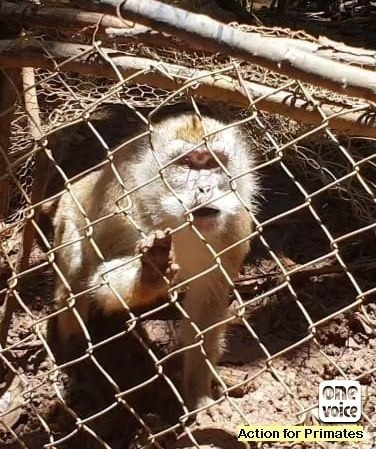
Action for Primates is concerned for the welfare and future of 440 long-tailed macaques who were recently seized by police and officers from the Ministry of Agro-Industry in Mauritius. According to news media reports, the monkeys were being illegally held in single cages in a building in Jin Fei. The authorities suspect that the monkeys, who were captured in the wild, are part of an illegal trafficking network. The director of a company who was arrested and then released on bail, stated that he had applied for a permit to export the monkeys and was waiting for a response from the ministry.
What you can do to help (for more information on the issue, see below):
Action for Primates is calling on the authorities to carry out an urgent investigation into those involved in the illegal capture and captivity of these monkeys, and for full transparency regarding the current situation and fate of these unfortunate individuals, including a visit by a representative from an animal welfare group to assess the situation. We also urge the authorities to show compassion and return these monkeys to the wild where they belong, rather than give them to companies where they will be used for breeding or exported to laboratories.

We hope that the widespread interest and shock over this case will help to raise awareness about the plight of long-tailed macaques in Mauritius, and the brutal trade in their lives for the global research and toxicity (poisoning) testing industry which has expanded in recent years, with almost 12,000 individuals exported in 2022. The macaques are held captive in their thousands at several breeding and export companies, their offspring taken away to be sold to laboratories in the US and Europe. Disturbingly, in recent years, the commercial trade in capturing wild long-tailed macaques for breeding and export has resumed in Mauritius.
Wild monkeys in Mauritius are not protected. They are trapped for many reasons, including to be eaten, kept as 'pets', exported to laboratories directly or used for breeding and their offspring exported, or simply killed because they are considered to be a 'nuisance'. Many people are unaware that, in Mauritius, monkeys may be captured to be sold as 'pets' or to be killed and eaten. Treating sentient and intelligent beings this way is appalling. The trapping of wild monkeys is a practice that is universally condemned because it is cruel. It causes immense suffering, not only for those who are removed from their homes, but also for those family members and others left behind.
In 2021, Biosphere Trading, one of the companies exporting monkeys, was granted permission by the government to expand its facility and to capture up to 1,000 monkeys to be used for breeding. According to a news report at the time, Biosphere intended to provide landowners and their tenants with traps to capture monkeys and would then offer to buy selected individuals, effectively placing a bounty on the monkeys' heads. Biosphere did not indicate what was to be done with unwanted individuals. Such an approach to the trapping of wild monkeys adds an additional level of inhumanity to the situation.
In 2022, concerned residents in Mauritius alerted Action for Primates and One Voice that monkeys were being trapped in several locations, including Vallée-Pitot in Port Louis. The trapping was being done for one of the companies that exports monkeys overseas to laboratories. Video footage showed a large gang cage into which unsuspecting monkeys were being lured by food and then trapped. The distressed monkeys, who can be heard crying out, were placed into small transit crates and loaded onto truck and driven away.
15 March 2023: Call to UK government to include animal cruelty content in Online Safety Bill
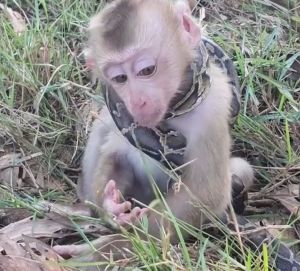
Animal protection, wildlife and anti-trafficking organisations from the UK and across the globe, including Action for Primates, have joined forces to call on the UK government to bring animal cruelty content within the scope of the Online Safety Bill. Your help is urgently needed:
The UK Online Safety Bill establishes a new regulatory framework to increase accountability of online technology companies and protect users, especially children and vulnerable adults, from harmful online content. The important issue of animal cruelty content will be raised when the Bill goes through the committee stage in the House of Lords. An amendment tabled by Lord Stevenson of Balmacara would add offences under section 4 of the Animal Welfare Act 2006 (unnecessary suffering) and offences under section 1 of the Wild Mammals (Protection) Act 1996, to the list of priority offences set out in schedule 7.
Such content involving animal abuse and cruelty, especially towards baby monkeys, is available on social media platforms, including Facebook, TikTok and YouTube. Videos posted show the deliberate infliction of pain and fear, causing physical harm as well as emotional distress. Even more disturbing is content in which baby monkeys are deliberately and gratuitously abused, tortured and killed for 'entertainment'. Its easy accessibility puts people, particularly children and other vulnerable groups, at risk and is likely to cause them considerable psychological damage and harm.
Widespread support comes from dozens of organisations, including the Wildlife and Countryside Link, the largest environment and wildlife coalition in England, and the Asia for Animals Coalition (SMACC), who are urging members of the House of Lords to speak in favour of the Stevenson animal cruelty amendment at committee stage and to urge the Government to make this change to the Bill. By doing so, Ministers can address a substantial source of online harm to children and help uphold the UK's reputation as a world-leader in animal welfare.
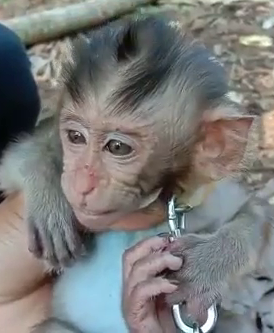
Sarah Kite, co-founder of UK-based project, Action for Primates, stated: The posting of monkey torture videos on social media platforms depicting extreme violence inflicted upon baby monkeys is sickening. Self-regulation by the tech platforms is not working, and effective legislation is required to stop this harmful content. We are grateful to Lord Stevenson of Balmacara for tabling this amendment and urge the Government to include animal cruelty content within the scope of the UK's Online Safety Bill.
The fact that online animal cruelty content is easily available and accessible by children and other vulnerable groups has been demonstrated by several studies:
young children are being exposed to horrific incidents of animal suffering online in ways previous generations have simply not experienced.(https://www.rspca.org.uk/-/16_10_18_genkind)
It's worrying that people who wouldn't ordinarily see animal cruelty are being exposed to it online. Not only could it encourage other people to do the same but it creates a society that has become de-sensitised to some of the most horrific acts of cruelty to animals which is a backward step for us as a nation of animal lovers.(https://www.rspca.org.uk/-/news-reports-of-animal-abuse-doubled)
Evidence that demonstrates the risk to children and young adults of being adversely affected by exposure to animal abuse:
There is emerging evidence that childhood exposure to maltreatment of companion animals is associated with psychopathology in childhood and adulthood.(https://doi.org/10.1016/j.chiabu.2017.09.004)
Examples of baby monkey abuse videos that have been posted on social media include:
Such acts of extreme cruelty and depravity are recorded and posted for the 'enjoyment' of viewers. Social media platforms are providing meeting places and an easy way for those people who enjoy watching monkey suffering to connect. The people leave vile and abusive comments encouraging more violence towards monkeys. Some post their contact details to private groups such as Telegram so that people can access additional abusive videos.
6 March 2023: Capuchins subjected to invasive surgery to study effects of chewing
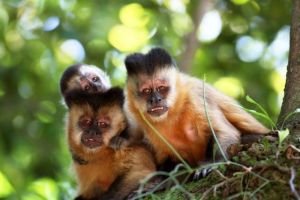
Capuchins were subjected to multiple episodes of head surgery and food deprivation in publicly funded research at the University of Chicago in the US, for the sole purpose of determining the effect of feeding (jaw movements or chewing behaviour) on the points where the plates of the skull come together (called sagittal sutures) (Byron et al 2023). Researchers from several other universities were also involved, including Mercer University, Texas A&M University College of Dentistry, University of Illinois, University of Pennsylvania, University of the South, Washington University and University of Johannesburg.
The research was reviewed and approved by the University of Chicago's Institutional Care and Use Committee and was funded entirely using hundreds of thousands of public dollars through grants 0725147 and 0725183 from the National Science Foundation.
Two adult capuchins each from the genera Cebus and Sapajus were used (the authors could not identify the species). One was female, the other three were male. The source of the capuchins was not stated, but they had been used in previous research in which they had been trained
to eat while restrained in a primate chair
.
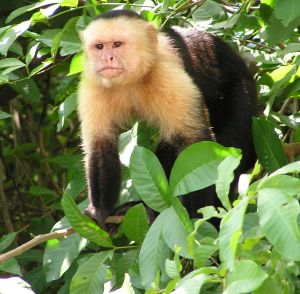
Each capuchin was subjected to the following four times:
food-deprived for 24 h
degreased, recording devices were glued to the bone using
cyanoacrylate adhesive; the skin incision was closed
primate chairfrom Plas Labs, Lansing, MI, during which recordings were made while they ate a variety of foods; at some point prior to each recording sessions, each individual also had several electrodes inserted through the skin into the muscles used for chewing, in some locations until they
contacted bone; there was no mention of any anaesthesia having been used for this procedure
itscage; contrary to proper protocol for reporting research, there was no description of the housing conditions, but from the wording used by the authors, it seemed clear that each capuchin was housed alone in a cage so that they were deprived of social contact critical for their well-being
There was no attempt by the authors to couch this work as being invaluable in helping people. For the sake of pure intellectual curiosity, each of these four capuchins had to endure not only the suffering inherent in being held captive, but also the suffering involved in 'training' to force them to sit for long periods in a primate chair
; four 24 hour periods during which they were deprived of food; eight episodes of anaesthesia and the considerable illness of recovery; and four episodes of invasive surgery to implant recording devices onto their skulls. Despite all this, the authors acknowledged what we believe have to be considered severe shortcomings of the work: The four individuals available for study did not constitute an ideal sample. Their precise species membership is unknown, and the sex balance was uneven (three males and one female) which also impacts the cranial phenotype variable.
The public are told repeatedly and at every opportunity that non-human primates are only used in research vital to understanding and helping humans. We are also told that researchers and funding agencies are working toward ending the use of non-human primates at some point in the (distant) future. This work with the capuchins is just one more example of the falsehoods of all these claims.
Please voice your objection to this continued abuse of non-human primates in the name of science:
Reference:
15 February 2023: Monkeys at Angkor Wat continue to be harassed for social media videos
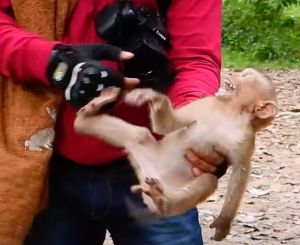
Macaques at Angkor Wat are continuing to be harassed and persecuted by people who film them for views on social media, as highlighted in a new report (Monkey Harassment Continues in Angkor Wat) and video compilation (Monkey Abuse Continues in Angkor Wat) revealed by Action for Primates, Lady Freethinker and Stop Monkey Abuse Asia. The report and video reveal how monkeys are still being followed with cameras, interfered with, picked up and carried, forcibly separated from one another, and given food and cartons of milk.
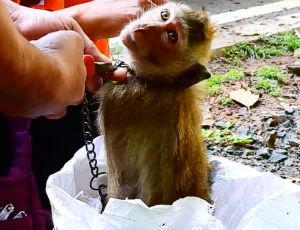
Action for Primates and Lady Freethinker, together with Stop Monkey Abuse Asia, have been campaigning for an end to the persecution, exploitation and abuse of monkeys at Angkor Wat, a popular tourist destination, UNESCO World Heritage Site and home to several troops of long-tailed and northern pig-tailed macaques. Following our investigation in 2022 and letters of concern to APSARA, National Authority in Cambodia and UNESCO, APSARA released a public announcement in October 2022. They acknowledged the negative impact that feeding of the monkeys was having on their welfare and public safety and urged people not to feed or have contact with the monkeys. They also stated they would take legal action against those who commit crimes against monkeys and other wildlife at Angkor Wat.
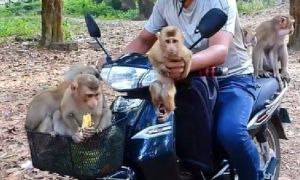
After spending several weeks monitoring social media channels and groups run by video operators in Siem Reap, Action for Primates, Lady Freethinker and Stop Monkey Abuse Asia have concluded that, following the APSARA statement, the situation for the monkeys has not improved. Our Report documents that the abuse is continuing, with videos being posted on numerous social media platforms such as YouTube and Facebook. These videos show the continuing deplorable activities of video operators deliberately interfering with and harassing the monkeys, causing stressful and distressing situations and disrupting their social groups in order to create content for online 'entertainment'.
There have also been reports of video makers staging 'rescues', as well as releasing monkeys who have been raised as 'pets' into the existing wild population at Angkor Wat. In one disturbing video, a monkey was brought to Angkor Wat in a sack, with a chain around her neck and tape binding her arms and legs. These former 'pet' monkeys, who are not part of the established troops, are at risk of serious injury and death. It is obvious that the operators are only interested in creating drama for filming rather than looking out for the welfare of the captive individuals.
Announcement from APSARA in October 2022, following an investigation and appeals by Action for Primates, Lady Freethinker and Stop Monkey Abuse Asia, included the following:
In order to maintain the harmony of wildlife in Angkor Park, we would like to request the cooperation from the public and relevant authorities working together to prevent all these inappropriate activities that have been negatively impacting management of Angkor Park, which affects national pride and honor. At the same time, we urge national and international tourists to stay away from the monkeys and wildlife to avoid any harm...We will also take legal action against those who have committed crimes against monkeys and other wildlife in Angkor Park without exception.
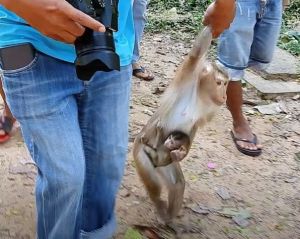
Sarah Kite, co-founder, Action for Primates, stated: For the sake of the monkeys and the safety of the public, we urge APSARA to fulfil the pledge it made, and intervene to stop this inhumane, unlawful persecution and exploitation of the macaques at Angkor Wat. A strict ban on people interacting with and feeding the monkeys must be enforced.
The footage is clear – video operators continue to harass the macaques for the sole purpose of 'entertainment' and making a profit,
said Nina Jackel, founder and president of Lady Freethinker. It's crucial that Cambodian officials live up to their promises and take legal action against anyone who harms these magnificent animals.
Shaz Daisy Torrance, Stop Monkey Abuse Asia, stated: We are calling on APSARA to enforce the law, which is currently being ignored by video operators, at Angkor Wat. In particular, the treatment and abandonment of former 'pet' macaques in the temple complex is cruel and inhumane. They deserve freedom and a chance to return to a life in the wild.
Take Action for the macaques at Angkor Wat:
23 January 2023: US tax payers fund attempt to develop a non-human primate model
of autism
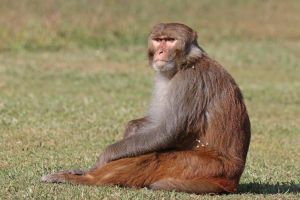
The National Institutes of Health (NIH) and the science community at large offer repeated assurances that non-human primates are used in research only when necessary, when there is no other way to gain information that will advance the human condition. Despite this, we continually see published work on studies in which various species of non-human primates were used, mutilated and killed in the name of science. In most cases, not only is the information gained not applicable to humans, it is either available already or can be obtained in ethical and humane studies on humans.
A recent example of such a study is one in which captive rhesus macaques were observed to see if they had behaviour that might suggest autism-like
traits (Talbot et al 2022). The work was done at the California National Primate Research Center (CNPRC), which is funded by the public through the NIH (grants HD087048, MH020016, OD011107), comprising of many millions of US dollars. The authors were affiliated with the University of California-Davis, Cornell University, the Florida Institute of Technology and Stanford University. They wanted to use the information gained to identify an animal model
which could then be exploited and manipulated in order to understand behaviour that might be translatable to human autism.
Autism is a spectrum condition and refers to a broad range of conditions thought to be influenced by a combination of genetic and environmental factors. Looking for autistic-type traits in monkeys is a simplistic, reductionist and mechanical approach to this complex condition. Furthermore, the rhesus macaques in question, even though being 'housed' outdoors in large groups, are not afforded the freedom and opportunities that would be present while living freely in their natural homes. Their development and behaviour would be different. Because they are not normal in the true sense of the word, findings in them are likely to be misleading.
More importantly, there is no shortage of studies involving humans with autism. A search of the National Library of Medicine online records reveals tens of thousands of such studies. Despite this, rather than pursuing humane and human-relevant areas of research, researchers are once again increasing – not decreasing – the use of non-human primates by trying to find new ways of using non-human primates as surrogates for humans. Once they 'establish' their animal model
, it is almost certain that they will begin subjecting the macaques to various manipulations including giving experimental drugs or doing surgery to implant electrodes in order to study the connections in the brain.
This abuse of non-human primates must end. As long as the National Institutes of Health and its branches continue to reward researchers with millions of dollars annually to use and abuse non-human primates in the name of science, and journals such as the American Journal of Primatology continue to publish the results, research entities will continue to use non-human primates as surrogates for humans, often resulting in misery, suffering and death for these individuals. We ask people to send a message to the directors of the NIH and the relevant branches and object to this continued exploitation of non-human primates:
Reference:
Information on NIH grant support (funding) is taken verbatim from relevant publications. If you have difficulty with any links provided, you can do your own search through the NIH RePORTER site: https://reporter.nih.gov/, by copying and pasting the grant number into the Search field on the form.
Be aware that some grants include funds for more than experiments on non-human primates.
20 January 2023: Entire population of vervets to be slaughtered on Sint Maarten
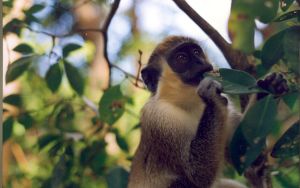
Action for Primates is urging the government of Sint Maarten to abandon its appalling and inhumane plan to kill the entire population of green monkeys (Sint Maarten approves plan to destroy entire population of vervet monkeys). The slaughter is reportedly to 'resolve' the issue of negative interactions between people and the monkeys. Funding will be given to the NGO, Nature Foundation St Maarten, to capture and kill the entire population, estimated to be around 450 individuals, over the next three years. The slaughter of hundreds of sentient and intelligent beings will repulse people around the world and tarnish the reputation of Sint Maarten as a popular Caribbean holiday destination.
An open letter to the government of Sint Maarten, signed by over 60 groups and organisations, including Action for Primates, and individuals representing experts in the field of primatology, animal welfare, rescue and rehabilitation, has been published. The letter calls for the adoption of a sterilisation programme as a humane solution to managing the situation. Sarah Kite, co-founder of Action for Primates, has published an article summarising the situation with the vervets in One Green Planet.
Dr Nedim Buyukmihci, a veterinarian with many years experience of working with non-human primates in different settings, stated: Non-human primates share many of the important characteristics we value in ourselves. There is a greater awareness of the genetic proximity of non-human primates to human beings together with their capacity to experience pain, suffering and distress similarly to people. With the growing acknowledgement of the negative impact human activities are having on the planet and its inhabitants, it is more important than ever that we reassess the way we not only treat non-human primates, but how we humanely resolve negative interactions.
Rather than dismiss vervets as a 'pest' or a nuisance and killing them, Action for Primates appeals to the government and communities of Sint Maarten to learn to adapt their behaviour in ways that will help to prevent problems arising in the first place, and if problems arise, to support resolving such 'conflicts' humanely. Considerations for non-lethal resolution include reproductive control such as sterilisation combined with education programmes to help the public deal with and prevent negative interactions with monkeys.
Please speak up for the vervets on Sint Maarten and urge the government to abandon this inhumane plan and instead adopt a humane approach to any negative interactions with people:
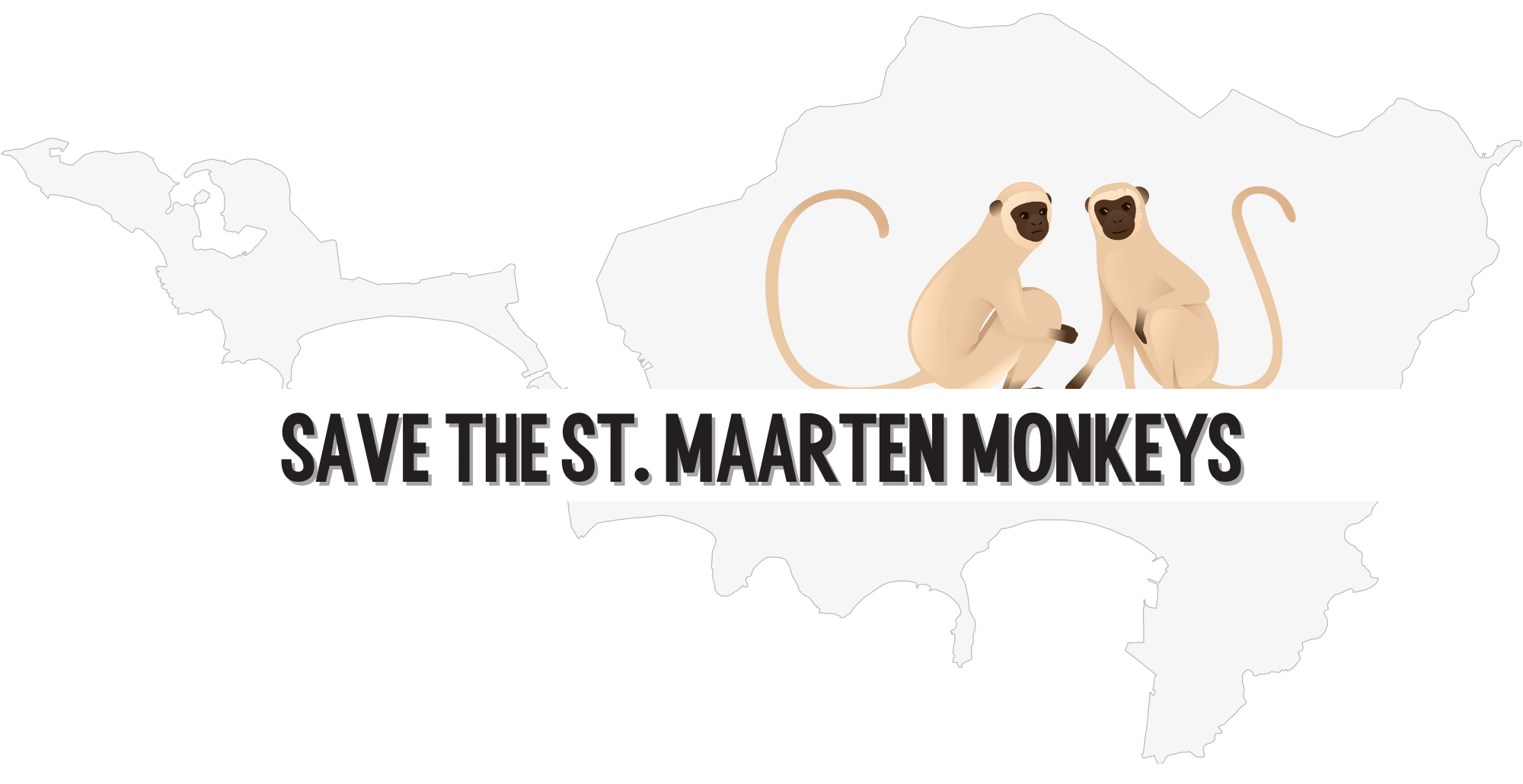
16 January 2023: Your help needed to provide protection for long-tailed and pig-tailed macaques in Indonesia
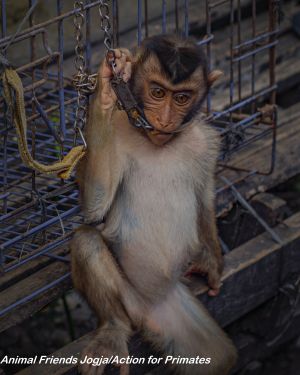
Harrowing images of baby long-tailed and southern pig-tailed macaques on sale at a market in Indonesia have been released by Animal Friends Jogja and Action for Primates, illustrating why these non-human primate species are in such urgent need of protection. These bewildered and distressed infants, who should be in the protective and nurturing care of their mothers and extended family, were found chained by the neck and imprisoned in small cages at this busy market alongside many other wild and domestic animal species.
Long-tailed and southern pig-tailed macaques are indigenous to Indonesia and are part of the rich and diverse ecosystem, contributing to the country's unique biodiversity. In 2022, the IUCN Red List uplisted the conservation status of both species to Endangered. Despite this, neither species is being protected. Without such protection, and labelled as 'pests', the macaques are persecuted, killed or captured – abducted from their natural habitat, family and social groups – to be sold at markets and into the 'pet' trade. Infants are taken from mothers to be kept as 'pets', abused for "likes" and profit online, or forced to 'perform' on the streets as 'entertainment'.
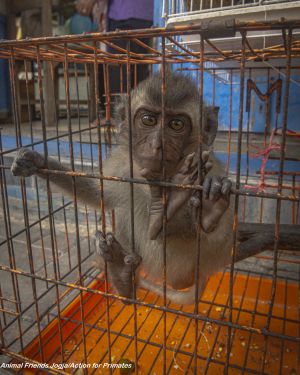
Long-tailed macaques also suffer because of the global trade in non-human primates for research and toxicity (poisoning) testing, captured for breeding purposes by companies that supply thousands of macaques to laboratories in Indonesia and overseas, including China and the USA. Harrowing video footage released by Action for Primates, revealed the shocking cruelty during such capture of long-tailed macaques in Indonesia (click here see our previous Take Action alert) and the inhumane way in which they were treated. The monkeys were trapped inside large nets and forcibly removed by hand, often dragged out by their tails (long-tailed macaques' tails are not prehensile, making spinal injury an issue) or pinned to the ground by a trapper's foot and removed, to be stuffed head first into sacks or crammed into wooden crates. On capture, infants were separated from their mothers, and 'unwanted' alpha males were beaten down with a pole and their throats cut with a machete.
The Primates Fight Back Movement, a coalition of animal protection, environment and conservation groups, including Action for Primates, is calling upon the Indonesian Minister of Environment and Forestry to protect long-tailed and southern pig-tailed macaques from exploitation, persecution and abuse.
The Asia for Animals Macaque Coalition has published The Macaque Report – Indonesia's Unprotected Primates. The Macaque Coalition comprises local and international animal protection organisations, including Action for Primates, which share an interest in protecting some of the most heavily exploited and misunderstood non-human primates on earth: macaques.
What you can do to help: Please urge long-tailed and southern pig-tailed macaques in Indonesia to be given protection:
13 January 2023: Capuchin monkeys killed just to get their brains in Brazil

Five adult capuchins, two females and three males, were killed for no other reason than to obtain their brains. The work was done at the Federal University of Rio de Janeiro (Universidade Federal do Rio de Janeiro) in Brazil and was approved by their Ethics Committee for the Care and Use of Experimental Animals
and done in accordance with the guidelines of the National Institute [sic] of Health for the Care and Use of Laboratory Animals
. It was published in the Journal of Comparative Neurology (Bonfim et al 2023).
There was no mention of the species of the capuchins, only that they were of the genus Sapajus. No information was provided on the source of the individuals nor under what conditions they were housed before their lives were brutally ended. Each individual was deeply anaesthetised and then killed by injecting a poisonous substance (fixative) directly through their chest cavity into the heart.
The work was done just to see if a specific part of the brain (inferior parietal cortex
) had a similar structure to that seen in macaques and how that might be considered in the context of evolution. In addition, it was part of a Master Dissertation
project for one of the authors. The findings have no relevance for capuchins or any relevance to humans. We do not know whether the authors knew which species they were using, but we do know that not all species of a particular genus are identical; there are at least seven species of capuchins classified under the genus Sapajus and they have different behavioural traits. This calls into question the 'science' of this study. Furthermore, source and housing conditions have effects on the development of individuals, including of the brain and probably particularly the area the authors sought to examine: Skilled hand movements and tool manipulation are landmarks [sic] abilities observed in capuchin monkeys
. The development of the brains of individuals who are born in their native land and who develop subject to the normal environment comprising land and vegetation, as well as the learning opportunities from their parents and extended family, will almost certainly be substantially different from those who are raised in a laboratory environment. Despite this, such information was not provided.
This work was simply carried out for 'intellectual curiosity'. It was a tragic waste of the lives of five individuals who should have been living freely in their native habitat, with others of their kind, including friends and family. We are told repeatedly that non-human primates are used only when necessary; this is yet another example where such assurances clearly are false.
What you can do to help:
Reference:
3 January 2023: Infant monkeys deliberately subjected to maternal deprivation and maltreatment in publicly funded research in US
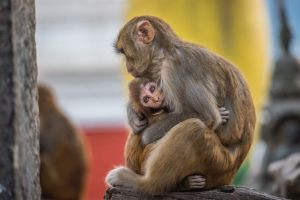
In this shocking and particularly inhumane publicly funded research carried out at Emory National Primate Research Center, Emory University, and disturbingly deemed worthy of publication by the journal Psychoneuroendocrinology, researchers purposefully fostered
infant rhesus macaques with mothers known to maltreat their offspring (McCormack et al 2022). The infants were part of a group of 42 who had been removed from their biological mothers at birth and then provided with either a competent
mother or one who had a history of infant maltreatment
. The researchers wanted to observe the rates of maternal abuse and rejection received
by the maltreated infants. In addition to outright rejection, infant maltreatment was defined, among other things, as physical abuse...at least 3 instances of violent behaviors of the mother directed towards the infant...that cause pain and distress, e.g. dragging, crushing, throwing, or roughly grooming or carrying the infant
. These behaviours produced distress in the infants.
Despite acknowledging that childhood maltreatment is a devastating form of early life adversity/stress
resulting in increased risk for psychopathology (e.g., anxiety, depression, post-traumatic stress disorder -PTSD), substance use disorders, cognitive deficits, obesity, and inflammation
, the researchers created even more misery and suffering by causing similar damage in infant monkeys. Unsurprisingly, the researchers concluded that monkey mothers who maltreat infant monkeys provide an overall lower quality of care
leading to lasting problems for the infants and that caregiving at a very young age is critical to the development of both emotional and physiological regulation
.
The public are repeatedly told that non-human primates are used in research only when absolutely necessary and only when there are no other alternatives available. This shameful experiment, which will likely be repeated in various forms in the future, resulted in extreme suffering for infant monkeys and harm that may last their lifetime. It demonstrates the meaningless nature of such assurances and a lack of commitment to stop using non-human primates. Clinical studies – humane and ethical – have been and can continue to be done on relevant populations of people in order to get data that are directly applicable to people. As is always the case with the publication of the macaque studies, the authors acknowledged that many similar studies have already been done in people.
The work was funded entirely by public funds through the National Institutes of Health and its branch, the National Institute of Mental Health (NIMH). Included were grants: MH078105, MH086203, OD011132 and OD010757. These grants comprise tens of millions of US dollars.
Information gleaned from studies on human beings is the only way to definitively help people; so-called animal models simply do not work, as has been pointed out by a previous director of the National Institutes of Health, of which the NIMH is a part (McManus 2013). Moreover, experts in primatology are calling for an end to this type of research (Padrell et al 2021). The many millions of tax-payer funds wasted annually on this kind of research would be of substantial use in helping people with mental health issues directly, and now, not at some never to be achieved time in the future.
This abuse of non-human primates must end. As long as the National Institutes of Health and its branches continue to reward researchers with millions of dollars annually to abuse non-human primates in the name of science, and journals such as Psychoneuroendocrinology continue to publish the results, research entities will continue to concoct these cruel experiments that comprise misery, suffering and death for these individuals. We ask people to send a message to the directors of the NIH and the relevant branches and object to this inhumane research causing maltreatment of rhesus macaque infants:
References:
[Elias A. Zerhouni, M.D., NIH Director 2002-2008]: "We have moved away from studying human disease in humans," he lamented. "We all drank the Kool-Aid on that one, me included." With the ability to knock in or knock out any gene in a mouse–which "can't sue us," Zerhouni quipped–researchers have over-relied on animal data. "The problem is that it hasn't worked, and it's time we stopped dancing around the problem...We need to refocus and adapt new methodologies for use in humans to understand disease biology in humans."
Here, we will review previous studies showing that primates have complex behaviour and cognition, and that they suffer long-term consequences after being used in invasive research.
Although some invasive studies have allowed answering research questions that we could not have addressed with other methods (or at least not as quickly), the use of primates in invasive research also raises ethical concerns. In this review, we will discuss (i) recent advances in the study of primates that show evidence of complex behaviour and cognition, (ii) welfare issues that might arise when using primates in invasive research, (iii) the main ethical issues that have been raised about invasive research on primates, (iv) the legal protection that primates are granted in several countries, with a special focus on the principle of the 3Rs, and (v) previous and current attempts to ban the use of primates in invasive research. Based on this analysis, we suggest that the importance of a research question cannot justify the costs of invasive research on primates, and that non-invasive methods should be considered the only possible approach in the study of primates.
In this study, we will use the term invasive research to refer to all research that (i) is conducted in the lab, (ii) implies stressful and/or painful body manipulations of individuals, and (iii) is not aimed to increase their welfare. Such body manipulations can range from inoculation with infectious agents and surgery to drug testing and blood sampling, but exclude veterinarian applications that directly benefit the animals...
The exact number of NHPs currently used worldwide in invasive research is unknown, but estimates suggest that more than 100,000 NHPs are used every year, mostly in the USA...In the United States, the annual report of animal usage informed that 70,797 NHPs were housed in research facilities used in regulated activities; 26,137 of these animals were used in painful procedures and received pain relieving, or similar, drugs, while 802 were subject to painful procedures but did not receive drugs because they would adversely affect results...
Information on NIH grant support (funding) is taken verbatim from relevant publications. If you have difficulty with any links provided, you can do your own search through the NIH RePORTER site: https://reporter.nih.gov/, by copying and pasting the grant number into the Search field on the form.
Be aware that some grants include funds for more than experiments on non-human primates.
![]()
![]()
![]()
![]()
![]()
Contact us via E-mail
Copyright © 2020-2026 Action for Primates. All rights reserved.